Groton School
SAN FRANCISCO
Texas
Dominican Republic
Ireland
Scotland
FRANCE Greece
Spain
Italy
China
INDIA
Uganda
Peru
Japan
INDONESIA
Tanzania
BOTSWANA
South Africa

SAN FRANCISCO
Texas
Dominican Republic
Ireland
Scotland
FRANCE Greece
Spain
Italy
INDIA
Uganda
Peru
Japan
INDONESIA
Tanzania
BOTSWANA
South Africa
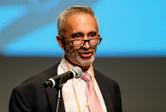




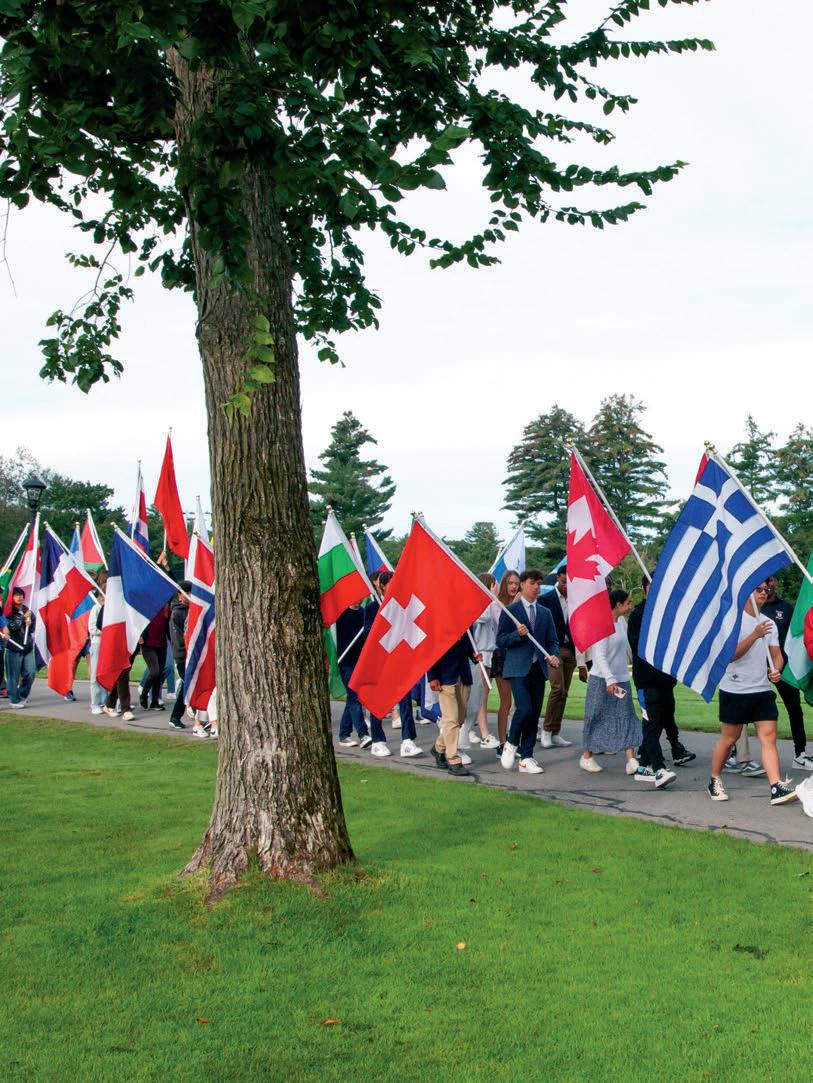
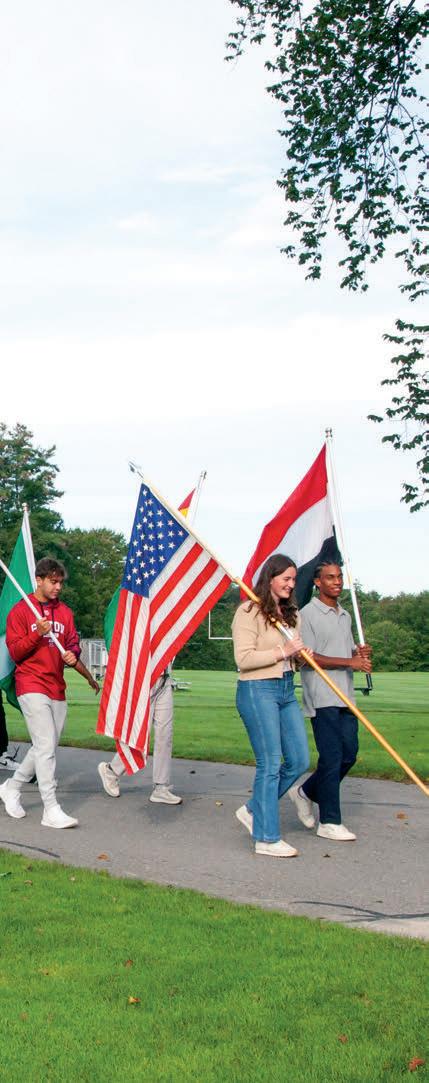

How a fresh look at global education helped bring the world to the Circle.
Celebrating the “triumphant” Form of 2023. page 22
Spring showers couldn’t dampen the spirit of more than 350 alumni and their families returning to the Circle. page 38


Our Groton community is a global one. We have students, faculty, staff, and alumni from all over the world. The stories and traditions that make up their lives enrich our shared Groton journey, as we challenge and learn from each other.
Each fall at the start of the term, we celebrate this international diversity with a parade of flags following Chapel. It’s a tradition I started in 2017 as a tangible way to see the diversity of our student body, and to show how important these global roots are to the Groton experience.
As the students walk the Circle holding flags representing their home country or land of heritage, I imagine they feel a beautiful sense of patriotism. After all, it’s natural to be proud of where you’re from, and we embrace patriotism here at Groton.
As I told our community at my fall chapel talk, however, we go astray as a society when we confuse patriotism and pride in our heritage with nationalism and the hatred and exclusion of those different from us.
Borne out of ignorance, nationalism is a threat to freedom and democracy. It is dangerous, and often turns brutal: The extermination of more than six million Jews by Hitler, millions of Tutsis in Rwanda by their fellow Africans, the Biafran War in Nigeria. Sadly, the scourge of nationalism is on the rise in the U.S.
From 1976 until 1992, I was a refugee from South Africa where, as a high school student, I escaped assassination attempts. Some were not so fortunate.
It will come as no surprise to many of you that, during that time, I was arrested. What will come as a surprise to some are my arrests outside of South Africa on the continent of Africa. As a refugee, my United Nations assigned document simply said “Stateless.” As a result, I experienced the ugly side of nationalism inside jails or airport cells in African countries like Zimbabwe, Kenya, Senegal, Malawi, and Cameroon, as well as in England and the Portuguese Azores.
Before the fall of apartheid, people of African and South Asian descent were called non-whites, whereas those Africans from countries that were friendly to apartheid South Africa were given the status of “honorary whites.” Honorary whites
 Weiss
Weiss
were afforded the same privileges as white people and could dine with them, stay in their hotels, and ride on their trains and buses. Not so for us so-called non-whites. Because of this, some thought their status made them superior.
Thankfully, Nigeria and a few other African countries rejected this so-called status and forbade their citizens from going to South Africa. These places became a haven for political refugees like me. This is how I got my education and partly why I am here. Ultimately, America under President Reagan embraced Mrs. Maq and me, as well as our oldest son. South Africa spit us out because we fought against exclusion and hate.
I feel a strong affinity and devotion to South Africa, as well as to the United States—my ancestral and adopted homes respectively—and I know we can share a culture, norms, behavior, holidays, language, and the like without using those differences to incite hate against the other. The more we understand the causes and dangers of nationalism, the better equipped we’ll be to fight it.
That is why Groton’s embrace of diversity cannot be some hollow pledge. We must continue to examine engrained institutional biases and prejudices and to educate everyone on the Circle about the ethical imperative to stand up for others. Only then will we progress toward true inclusion.
Our Groton community is a living example of how patriotism can coexist with diversity and inclusion. This year’s parade of flags was the largest ever with fifty flags in total, including the one flag that unites us all: our shared Groton School flag. Seeing flags from six continents—from Argentina and Australia to Ukraine and Uganda—made me proud of my own dual heritage, and in the strides we’ve made toward making all feel welcome and valued at our home on the Circle.
 Temba Maqubela Headmaster
Temba Maqubela Headmaster

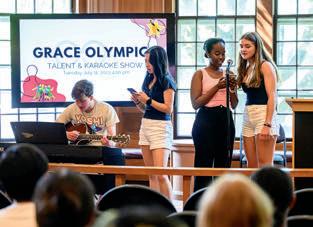
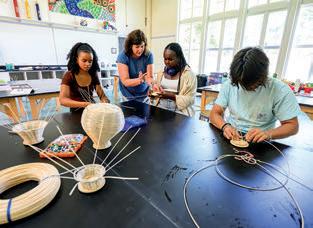

The 2023 GRACE cohort was the largest in-person group in the program’s eight-year history. GRACE combines student enrichment with recreation and art to help rising Fourth Formers prepare for the rigors of Upper School life.
Fifty-five GRACE Scholars returned to campus this past summer for four weeks of academic challenge, marking the eighth iteration of the program and the largest in-person enrollment since it began in 2016.
Each summer, GRACE (GRoton Accelerate Challenge Enrich) offers a variety of courses along with a healthy dose of recreation and art to rising Fourth Formers. The program is designed to propel students to advanced classes and to fill preparation gaps during the summer before Upper School. This summer’s group includes seven new Fourth Formers.
Most GRACE Scholars take two courses, choosing among math, science, English, Latin, French, Spanish, Chinese (new for 2023), and Modern Global History.
All GRACE classes are led by Groton School faculty, and this summer’s group once again included Headmaster Temba Maqubela, who taught science. Nine teaching assistants from the
Forms of 2020, 2021, and 2023 also participated; seven of the nine were GRACE Scholars themselves.
The 2023 scholars took part in several hours a day of classroom learning, as well as afternoons spent swimming in the school pool, paddleboarding, and playing games such as kickball and Capture the Flag. Wednesday nights were for special outings, to a trampoline park, for instance, or to go bowling or to the movies. Activities on campus included movies on the Circle and the third annual GRACE Olympics, while weekend offcampus excursions took GRACE Scholars to the beach, whitewater rafting, and ziplining.
This summer, GRACE also addressed student preparation gaps in math or English that were extended or intensified during the COVID-19 pandemic. In addition, Anna Martinez, Groton’s new assistant director of academic skills, served as a resource to GRACE faculty and was available for individual sessions with scholars during evening study hall.

LAUREN DUBOIS ’25 won a gold and a bronze medal in two races at the 2023 USRowing Summer Nationals. She was the stroke of a U17 USRowing Development Camp 8 (gold) and rowed 2 in a U19 8 (bronze).
On the evening of May 16, Shelly Jerrett P’24 offered an extremely informative and engaging Mini Circle Talk about her work as a former federal prosecutor in Massachusetts. Mixing humor with detail, Ms. Jerrett explained to students and faculty in attendance how federal prosecutions and prosecutors work, such as what differentiates grand juries from trial juries, and the indictment process in the federal system. She discussed some high-profile, notable cases prosecuted by her former colleagues in the District of Massachusetts, as well as some of her own trials and appeals she handled during her fourteen-year tenure as a federal prosecutor.
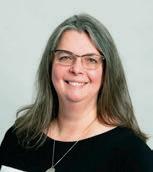
Ms. Jerrett, who now works as an attorney for Boston Scientific, expressed pride in her accomplishments as a federal prosecutor and the crucial role that federal prosecutors play in the American justice system. She also emphasized that the rule of law requires that prosecutors pursue justice, not simply convictions, and the seriousness of the duty as a prosecutor whenever someone’s liberty is at stake. And, she urged her audience to embrace their responsibility indeed their privilege as citizens to serve as jurors.
After her talk concluded, students asked Ms. Jerrett about a host of issues surrounding federal prosecution. When asked why she chose to become a prosecutor rather than a public defender, Ms. Jerrett answered that she had a calling to perform public service by protecting victims and society in general from crimes. While defendants are entitled to a vigorous defense, victims and society are also entitled to be represented by advocates who believe in protecting the public.
Tommy LamontCongratulations to Mei Matsui ’23 on her winning design in the fifth annual McCormick Library Bookplate Contest this past May.
Mei created the bookplate under the supervision of art teacher and printmaker, Jennifer Ho. In speaking of Mei’s bookplate, Ms. Ho said, “Mei’s design is truly out of the box, capturing elements such as our school mascot the zebra against Groton’s magical, starry, night sky. There is a sense of quietness to Mei’s design reflective of long, studious nights as one strolls back to their dorm for check-in and gazes up and out at the world beyond us all.”
Mark Melchior, the library director, added, “Mei incorporates all the elements of good bookplate design into this small frame, and gives the school mascot pride of place, a first in the bookplates we’ve featured. Look closely and you will see Mei’s initials in the constellation of start at top left. Truly a stellar design!”
Each year, the library invites Sixth Form artists to submit a design for consideration in the search for a bookplate to be used in our new book purchases for the coming school year. Many public and private library collections feature a bookplate in the endpapers of each book in their collections as a means of identifying ownership and also as an artistic statement about the collection or its owner.


Giulia Colarusso ’24 was chosen to USA Lacrosse’s U18 Select team at the National Team Development Program (NTDP) National Combine this past summer.
She was among forty-four of the nation’s top high school lacrosse players to represent their country in international competition this fall.
Since launching in 2019, the NTDP has helped serve as a pipeline to the U.S. National Team Program, providing athletes with exposure to players, coaches, and training methods from the national team program. Each year, more than 1,500 boys and girls participate in the program.
Giulia has committed to continue her student-athlete career at Boston College.

Groton’s Classics students excelled at the 2023 National Latin Exam, with 71 percent of the 163 students who took the test receiving an award.
On the Latin exam, 19 percent scored summa cum laude for a gold medal, 27 percent earned maxima cum laude for a silver medal, 17 percent were magna cum laude, and 12 percent were a cum laude
Colin Kim ’23 wrote a perfect paper for the Latin V exam.
Earning summa cum laude were
Jamie Abramson ’26, Daisy Adinkrah ’24, Sara Agrawal ’25, Lena Aloise ’27, Amelia Barnum ’24, William Cai ’26, Amanda Chang ’26, Olivia Ding ’26, Hanna El-Jeaan ’27, Eric Ge ’24, Nasir Hill ’26, Colin Kim ’23, Sarah Ku ’26, Jonathan Lai ’24, Michael Lu ’24, Damien Man ’26, Daniel Mao ’26, Bridget McAvoy ’24, Sophie Milner ’26, Arthur Murray ’26, Sydney Nelson ’26, Folasade Pickering ’26, Charles Rogers ’24, Jessica Shapiro ’26, Eliza Spence ’27, Eleanor Taggert ’24, Jaelyn Trudell ’26, Eleonore Wilson ’27,
Nolan Wilson ’26, Lindy Zhang ’25, and Tommy Zhang ’24.
The seven students who took the National (Ancient) Greek Exam all received awards.
Colin Kim ’23 won a Blue Ribbon. Larry Li ’23, Paulo Ley Duarte ’25, Jaden Adinkrah ’23, and Trip Wight ’25 won Red Ribbons. Jessica Lee ’24 and Zoe Friedland ’25 won Green Ribbons.
Congratulations to our talented Latin and Greek scholars, and to the dedicated teachers who inspire them!
Congratulations to Form of 2023 student-athletes who are now competing for their colleges and universities. Pictured from left: Bensen Han, Carleton College (football), Dylan Vigue, University of Michigan (baseball), Charlotte Maturo, Connecticut College
Ziggy

Aryan Mago ’24 received a President’s Environmental Youth Award for his creation of Together for Waterways, an online resource that harnesses the creativity, technology, and media skills of savvy students to inform consumers of the consequences of their purchases.
The organization came to be after Aryan noticed a problem while taking water quality samples for Worcester’s Cyanobacteria Monitoring Collaborative namely, that Worcester’s water bodies are filled with litter, scum, and invasive species. Following an investigation into EPA statistics, he learned that an astonishing 67 percent of his local watershed is impaired by trash, and this excludes harmful interference from algae, nutrient pollution, and invasive plants, each of which have their own startling statistics. While the Worcester Lakes and Ponds Program is working hard to address these watershed threats, Aryan felt that community involvement could make a difference.

Since 1971, the president of the United States has joined with EPA to recognize young people for protecting our nation’s air, water, land, and ecology. It is one of the most important ways EPA and the Administration demonstrate commitment to environmental stewardship efforts created and conducted by our nation’s youth.
Each year the PEYA program honors a wide variety of projects developed by young students, school classes and clubs, youth camps, and youth organizations to promote environmental awareness and action in schools and communities. Thousands of young people from all 50 states and the U.S. territories have submitted projects to EPA for consideration. Winning projects in the past have demonstrated impact in schools and communities in a wide range of subject areas. Participation in the PEYA program is frequently a life-changing experience for many of the young people and their project sponsors.
For more information, visit togetherforwaterways.org
And make a difference it has: So far, Together for Waterways has distributed flyers, provided action toolkits, and brought environmental data to more than 12,500 site viewers. The results have been remarkable: between 2021 and 2022, a 37 percent decrease in plastic litter, a 48 percent reduction in nutrition pollution, and a 23 percent decline in invasive aquatic species. Aryan’s work united all of Worcester under the power of the consumer for cleaner, more sustainable watersheds.
The President’s Environmental Youth Award (PEYA) recognizes outstanding environmental stewardship projects developed by K-12 youth. The PEYA program promotes awareness of our nation’s natural resources and encourages positive community involvement.

New faculty member Azmar Williams earned his PhD in History from Harvard University this fall. After successfully defending his dissertation —”A New Solidarity: Race, Diversity, and the Development of Modern Harvard, 1869 –1969”— he shared the following excerpt with fellow Groton faculty members.
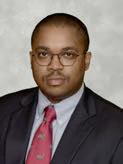
Diversity and inclusion are, today, almost ubiquitous buzzwords on American college campuses. A search for “diversity” and “inclusion” on the Chronicle of Higher Education’s website yields over 17,000 results; recent articles include “When Diversity Becomes a Bad Word” and “The More You Know About Your Students, the More Inclusive You Can Be in the Classroom.” Attached to offices, directorships, and centers, diversity and inclusion’s recent increased visibility has inspired both praise and contempt within the ivory tower and among the general public. Supporters welcome what they believe the words represent an attempt, after centuries of exclusion, to fully extend the immense benefits of university education and research as broadly as resources will allow. Critics, however, oppose such initiatives as wokeness run amok part of a faddish and reckless softening of the standards of excellence that helped establish America’s twentieth-century global preeminence in higher education. What these two camps share is the assumption that today’s focus on diversity and inclusion is new a break with rather than a continuation of a tradition. A look into the history of universities, however, proves otherwise.
Few would associate America’s university modernizers, serving between the Civil War and World War II, with present-day attempts to make universities more diverse and inclusive. They were, however, in many ways, pioneers of such efforts. Two things set their work apart from that of current administrators: the vast, concentrated power they held and, crucially, that their concepts of diversity
and inclusion were limited almost exclusively to white men and buttressed by legal discrimination. The gradual bureaucratization of university administration has diluted the former. The latter would be true up until at least the 1960s when the Black Freedom Struggle radically transformed America’s universities by forcefully separating the idea of progress from unyielding antiblack racism. This dissertation looks back at a time, in the late-nineteenth and early-twentieth centuries, when concern for diversity and inclusion centered on enriching the experiences of white male students.
Why and how did the concept of and approach toward diversity change among Harvard’s leadership in the century following the Civil War? From Reconstruction to the high tide of the civil rights movement, diversity for Harvard’s leadership meant a pursuit of white racial cohesion across various socioeconomic and regional backgrounds; and the administration used racial, ethnic, and religious exclusion to achieve it. After the Civil Rights Act of 1964, however, diversity took on a new institutional meaning: compliance with anti-discrimination law to protect the University’s access to a new postwar bounty of federal funds. The midcentury shift in focus, among the administration, from white racial cohesion to compliance did little to make Harvard a more welcoming place for the black students who arrived as part of the growing postwar influx. By demanding intellectual inclusion through the establishment of a black studies program, black undergraduates offered their own vision of the meaning of diversity that went beyond compliance. The gap between compliance and the demands and expectations of minority faculty, students, and staff persists today alongside the institutional remnants of Harvard’s quest for white racial unity a cause disrupted, but not destroyed.
Paul H. Mattingly, in his work American Academic Cultures: A History of Higher Education (Chicago, IL: University of Chicago Press, 2017), divides American university leaders into thematic “generational cultures” that stretch back to Colonial America. He assigns Charles William Eliot, who led Harvard from 1869 to 1909, to a post-Civil War “industrially driven” culture. Mattingly places A. Lawrence Lowell, Eliot’s successor, who served until 1933, into a later culture of “Progressive (urban) pragmatism.”
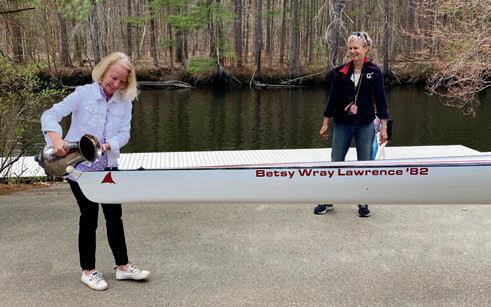
The Betsy Wray
Lawrence ’82 shell was christened on April 15, 2023, with members of the Form of 1982 and members of the girls first boat in attendance. In her first race, the Groton girls first boat secured victory over Lincoln.
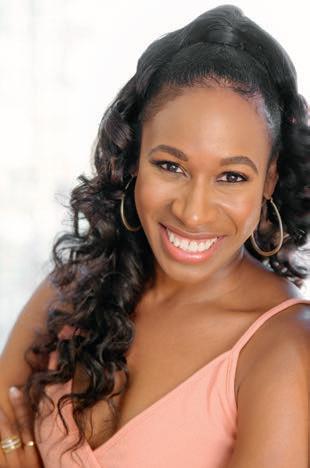
At the end of her Third Form spring break, Kristen V. Carter ’02 decided that she wanted to leave Groton. Once a super honor roll student who excelled in the gifted and talented programs in her hometown, Kristen struggled academically and questioned if she truly belonged as a member of the school community. She was passionate about the arts and didn’t have an outlet as a writer or dancer at Groton. She developed trichotillomania, a nervous condition which involved pulling hair from her eyelashes and eyebrows, and she became very depressed.
“I had lost my zeal for learning,” she recalls. “I had lost my zeal for socializing.”
Carter decided to stick it out, but something essential in her was missing.
For Carter, raised by a single mother in Newark, New Jersey, Groton was a huge leap. She and her mother both believed in what was possible when she left home for the Circle at age twelve so, as the struggles continued into Carter’s Fourth Form year, her mother recognized what was at stake. When Carter returned home, her mother created a summer boot camp for her: Every day she’d run two miles, during which Carter developed a mantra. “I literally would say during my runs, ‘I’m gonna take Groton by storm.’”
Her mother pushed her in other ways, too. “I read books by African American writers and I wrote essays every week,” Carter remembers. That summer of learning to believe in herself, saying yes to herself, set her up to thrive during her remaining two years at Groton.
She returned for the following school year as a Fifth Former and spoke with the headmaster, William Polk ’58 “My soul is dying,” she told him, in a way that she now lightheartedly remembers, but as a teenager, she recalls, “I felt like there was nothing here that I could identify with.” So she asked, “Can I create something?” And the answer was yes.
So, she asked to expand the dance program and pitched dance as a sport. She choreographed the dramatic plays, became an admissions prefect and Alliance for Student Harmony prefect, and oversaw gospel choir and the step team. Her grade point average increased thirteen points within one semester. By the end of Fifth Form, during Prize Day 2001, she was awarded the Anita Andres Rogerson Dance Prize. She fought for the expansion of the performance arts program, an effort that’s been cited as a major factor in the growth of that department. She created a corner of Groton that could help her expand and grow as a creative person.
“That year completely changed my life,” Carter explains. “There’s been nothing more challenging than having to prove myself to myself. I was really fighting for my voice.
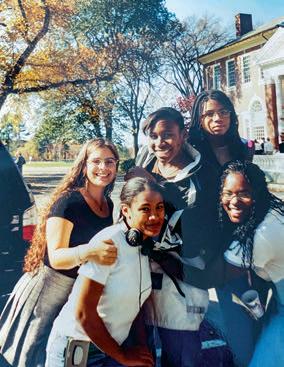
»
Today, at thirty-eight, she is among the youngest executive producers in Hollywood—following a trajectory which began when she started reading at age three and that aligns with her first position as a television writer at age twenty-one. All along the way, Carter has had to see herself in spaces where she might not be welcomed.
“I see how people show up based on their esteem; not based on their talent, but based on what they think about themselves,” she says. “In order for me to thrive on and off the Circle, I’ve had to maintain a strong sense of self.”
Carter graduated from Hofstra University with a major in television production and a minor in dance. She
In order for me to thrive on and off the Circle, I’ve had to maintain a strong sense of self.
That was the turning point in my life— not just in my high school experience.”
When not engaged with her schoolwork and extracurriculars at Groton, Carter was watching television—but in a very serious way. She would record music videos and TV shows like Moesha, later watching them with a notebook in hand, intuitively keeping notes on how and why different videos and shows worked. As she approached graduation, Carter expressed her desire to work in television production. A college guidance counselor suggested that she reach out to alumnus Stephen Hill ’80; she spent the summer before her college freshman year as an intern at BET on the popular music countdown series 106 and Park. “When they asked me to log time code, I didn’t realize I’d been doing time code my whole life,” she says.
applied for her first professional opportunity at BET when she graduated, and became a head writer for an entertainment news show at twenty-one years old. She worked consistently in the television industry until the recession hit, when she found herself ready to face new challenges with determination. She wrote her first feature film and submitted it to a screenwriting fellowship program based in Los Angeles.
She began saying yes to LA before LA knew anything of Kristen V. Carter. On an early visit to the city, she landed an informational interview, where someone asked if she lived there. Instinctively, Carter said yes. Coincidentally, a friend of a friend then asked if she’d sublease a room in her LA apartment. Another yes. “Within three days, I got a job, fellowship, and
an apartment.” As she recalls, in one week, her life changed because she kept saying yes.
“My mom and I said yes to the opportunity when I was twelve,” Carter says. “I said yes to myself when I was sixteen. When I reached out to Stephen Hill to introduce myself, I was saying yes to myself then.”
In the thirteen years since that trip to Los Angeles, Carter has built an impressive resume as a writer, producer, director, filmmaker, podcaster, entrepreneur, and speaker. She won that screenwriting fellowship, which led to the creation of her first short film. First Date was on the film festival circuit for a year and a half, during which time Carter was nominated for Best Short Film at San Diego Black Film Festival and won the Best First Time Filmmaker Award at the San Francisco Black Film Festival. She has made a name for herself in nonfiction and documentary television programming, working on The Voice, America’s Best Dance Crew, and most recently serving as executive producer on Profiled: The Black Man, which was recently honored by the Television Academy Honors for its “thoughtprovoking social justice content.” She is currently showrunning and executive producing a PBS live music concert special entitled Gospel Live.
Kristen V. Carter’s success depended upon her belief that she belongs. “My experience at Groton helped me show up fully in the world.” Though it was not always easy to be on the Circle, she had a fierce belief that she belonged. Today, she continues to see herself where others might not see her. She remembers being a student at Groton, looking through yearbooks to locate other Black women who had come through the school, thinking, “If she could do it, I can do it. I hope that I am that for another young person.”
— Meredith McCarrollWhen Michelle Canero ’99 became a lawyer, the last thing on her mind was following her mother’s roadmap into immigration law. Instead, she pursued corporate litigation, focusing on insurance defense and product liability for Fortune 500 companies while working her way along the partner route.
But today, she’s on the front lines of immigration reform in Miami, meeting with members of Congress to improve the way green cards are allocated. In 2008, her voice was one of the potent ones redirecting the conversation on the proposed bill H.R. 1044, intended to eliminate the per-country quota limits for employmentbased immigrants.
“It really ends up being this unfair system, where certain nationals are waiting ten years and more to get a green card because they’re considered oversubscribed,” says Michelle. “I advocated strongly against this piece of legislation, because it meant that all these clients that were coming in as investors, talent, athletes, and students would never qualify for a green card.”
As it turns out, family obligation and opportunity can be potent GPS systems to redirect a career. When Michelle’s father died suddenly of cancer, settling his estate became an engrossing international commitment. Her corporate litigation work consumed long hours, seven days a week, and she realized she had to take a leave of absence. Her mother offered her flexible part-time work at her own immigration firm.
“Earlier, I had said to my mom, ‘There’s no way I’m going to do immigration. It’s overwhelming.’ I’m a bit of an introvert,” Michelle says. “I didn’t think it was in my personality until I actually started doing it and discovered I had a passion for it.”
It was easy for passion to overcome introversion when she began to witness the accumulated difficulties and disappointment of those struggling for green cards. “Everyone says that people should get in line and get legal. But what they don’t realize is that our immigration system has in fact created barriers so people can’t get in a line. It’s pretty heartbreaking,” she says. “Clients

that come to me are shocked at how long and complex it is. And they say, ‘How are all these people living here illegally?’ And I say, ‘Yes, and they will never get a green card or a visa.’ Whereas if you want to do it the right way, it’s going to take years and $10,000 to $20,000.”
That first leave of absence from Michelle’s corporate job became a permanent departure, one her boss told her was a mistake she’d regret. She didn’t. Over the next ten years, she became a managing partner of her
mother’s firm, eventually realizing it was time for her to step out on her own. In 2021, she founded her own firm, Canero Fadul Immigration Law Group, which specializes in business immigration, representing corporations and investors hiring foreign nationals—from individual professionals to artists, entrepreneurs, and athletes all seeking to establish their roots in the U.S.
The pivot from business law to business-immigration law couldn’t help but be influenced by the fact that she could relate to the immigrant experience on a personal level. When Michelle was eight years old, her family emigrated to the U.S. from Venezuela, where she was born and where her parents met. Her mother

»
The more I showed up and the more I proved myself to be a person of integrity and substance, the more they seemed to listen.
was a British citizen originally born in Trinidad; her father was from Uruguay, working in Venezuela. They came to Florida so her mother could attend law school in Miami. When Michelle reached high school, the assumption was that she would go to boarding school as her mother had— in Scotland.
“I grew up in Caribbean climates. And all I heard about Scotland was that it was cold and dreary,” she said. She focused on schools in the U.S. instead, and was accepted into many throughout New England. But from the moment she stepped onto campus at Groton, she believed this was where she belonged. “It just felt right. Maybe because it was smaller. Maybe because Mr. [John] Niles, who did the interview, was so nice to me. I walked out of there saying, ‘This is it.’ And it ended up being such a good decision, and such a rewarding experience.”
Michelle credits Groton with instilling in her the structure, resilience, and self-sufficiency to make good decisions with confidence, and
easily rattles off the names of influential faculty members. She has fond memories of French teachers Rebecca Stanton and Catherine Coursaget, her advisor Ann Lally (“She was always there for me”), and her Latin teacher, Warren Myers, for pressing her intellectually in a way she’d never been challenged before. Shop with Doug Brown was memorable for the patience and wonder of learning to create something with her own hands. And she now regards the Amnesty International Club, which she launched with her classmates, as her first foray into international relations and advocacy.
Above all, she credits Groton faculty with an introduction to the growth mindset that if you were smart and capable, you’ve earned yourself a place at the table—and there was nothing you couldn’t do if you put the work into it. That she was someone of substance, and could accomplish things in life if she applied herself.
“I’m certain that’s where I got my drive. I remember when I was
first doing this immigration advocacy work, and I was flying to DC and meeting with all these very impressive and powerful people, from Senator [Dick] Durbin to Nancy Pelosi. I never was like, ‘How are you getting these meetings? How are you bold enough to go into that room and ask these questions and assert yourself?’” she recalls. “It was just what needed to be done. I knew the worst that would happen is that they wouldn’t listen to me. But the more I showed up and the more I proved myself to be a person of integrity and substance, the more they seemed to listen.”
Michelle knows immigration reform is a long road, not a one-anddone. They did succeed in getting that first version of H.R. 1044 opposed, and getting a better legislation in front of Congress and the Senate. Though, in the end, it didn’t have the desired result. For now.
“The solution still has not come to fruition yet,” she says. “But I’m always advocating for it.”
—Nichole Bernier
It’s nearly 10,000 miles from Botswana to southern California. This past summer, the two found common ground at Groton School.
How a fresh look at global education helped bring the world to the Circleby Sean Kerrigan
At first glance, the two places are worlds apart. Closer examination, however, revealed they had much more in common than one might think. The world is becoming smaller every day and, by connecting across boundaries to discover those commonalities and recognize what makes us different, we can learn from both.
This was one of the missions of the inaugural G-PIE Groton Program for Intercultural Exchange hosted on the Groton campus in July 2023. Students and teachers from Botswana (Maru-a-Pula School), Canada (Appleby College), China (WLSA Shanghai), England (Cheltenham College), India (the Welham Girls School), Rwanda (Kigali International School), South Africa (Imagine Scholar Program), and the United States (Episcopal High School in Virginia, the Webb Schools in California, and Groton School) gathered on the Circle to engage in a variety of workshops, activities, cultural performances, and discussions guided by the themes of culture, water, and artificial intelligence and technology.
The conference was designed to be both an enriching

intercultural learning experience for high school students and a professional development opportunity for educators to engage in those themes through a pedagogical lens.
“G-PIE is an attempt to reimagine globalism in this current epoch, where the world has become smaller, and to try and get us all to be a little bit more intentional and purposeful when we think about global programming,” says Groton Headmaster Temba Maqubela. “It’s an attempt born out of having attended too many global conferences where the student was not typically in focus, where the teachers were not in focus.”
By refocusing on learning and building purposeful connections, both for teachers and students, the conference proved more valuable and memorable for both.
says Laurie Sales, director of theater and dance at Groton School and one of the conference organizers.

“The intention was to bring students and their teachers from several different kinds of countries together to explore what it means to communicate across cultures, to problem solve, and how we can better listen to each other so that maybe we can look at some of the world’s problems from a more holistic, informed, and compassionate perspective,”
“One after noon [Groton ecology and environmental science teacher] Dr. [David] Black partnered with schools to explore issues of water security in their home communities,” she adds. “I walked in on a robust dialogue among students from Southern California and students from Botswana in which they realized that their home communities face the same ecological climate challenges. One of the teachers pulled up water supply maps for each of these regions and the similarities were obvious, except for the fact that one region is in the most resourced country in the world and the other is not. So the students from the Webb Schools really leaned into the lessons shared by the students from Maru-a-Pula. And in a way, the students from California had more in common with the kids who were there from Botswana around this issue than they would with kids from Massachusetts. That was the whole point of the conference: To foster intercultural collaboration toward future problem solving.”
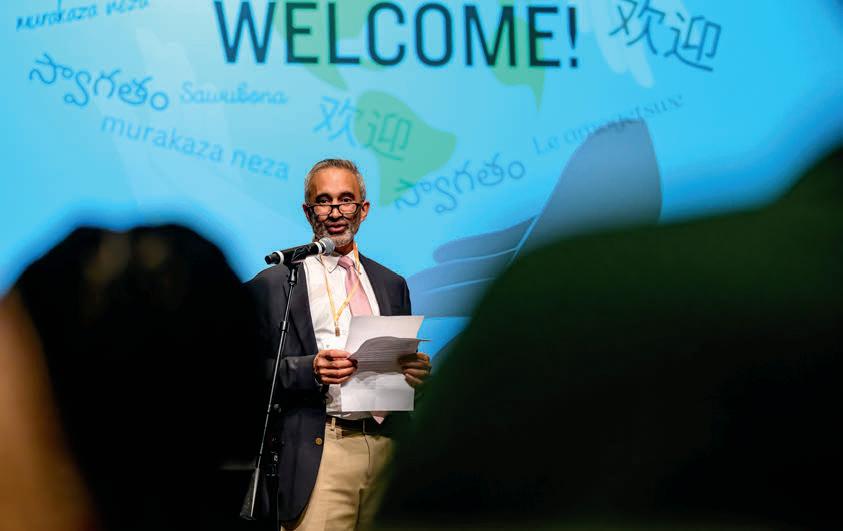
‘We realized that what we were trying to achieve was global competency. And if you want global competency, then there are skills and knowledge you need to acquire.’
When Nishad Das P’16, ’19, ’23 arrived at Groton in 1999 after growing up in the English educational system and teaching for nine years at Cheltenham College and Caterham School, he was surprised to see a lack of interaction with the larger educational world.
“When I first came to Groton, I was really surprised,” says Das, who took over as director of Global Education in 2011 before being named dean of Globalism and Experiential Learning in September 2022 (he’s also a member of the Mathematics and Computer Science faculty). “Because my entire education had been in the English education system. And for them, exchange students and exchange teachers are just part of the deal.
“There was zero interaction, I felt, outside the Circle,” he adds. “It was like they had their own world. They weren’t

interested in finding out what the other schools were even doing. It was just, ‘We are Groton, and we know how to do things.’ It was very inward looking.”
The first GEOs Global Education Opportunities began in 2000, but Das soon found that the overarching mission of empowering young students to change the world, while well intentioned, resembled too closely that of a missionary.
“We were building dining halls in Kenya, we were building staircases and community centers in Peru,” he says. “If you step back and think about it, it’s incredibly arrogant to think that you can go into the land of the Incas, the greatest builders in the world, and tell them how to build when you are unskilled laborers who know absolutely nothing about building.
“You think about a bunch of prep school students going to the developing world and trying to solve these problems, which the best economists in the world can’t solve,” Das continues. “In every way the message was wrong, and it made us rethink what it was we were doing.”
Understanding that a lot of time and effort had been put into the student experience abroad, Das reached out to Steven Bloomfield P’04,’07, then with the Weatherhead Center for International Affairs at Harvard University, to help with the transition. Bloomfield came to campus for regular listening sessions with faculty and, at the end of a year, it became clear

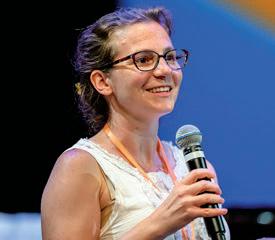

that the goal and approach of the GEOs had to shift.
“We realized and of course I realized it as well as we were going along that what we were trying to achieve was global competency,” Das explains. “And if you want global competency, then there are skills and knowledge you need to acquire. Skills like learning a language. Reading. And then of course the attitudes, and the traveling is what develops the attitudes. Meeting other cultures. And so if you’re going to go there, and go with this approach of changing people’s lives, then those attitudes are antithetical to what you’re trying to achieve.
“So we realized that we had to change the emphasis to learning from and with other cultures,” he continues. “You go there to learn, and you actually can talk to a lot of people. They say, ‘Yes, come to us, but you don’t have to do anything. Don’t worry. There’s a lot we can teach you.’ You go there, and you see these beautiful communities, and they get on very well together. Yes, they don’t have material things like we do, but that’s actually not a bad thing because while they don’t have acres and acres of land and their neighbors are living on top of each other, they know each other in and out of each other’s houses. And so there’s a community there that you just don’t have here.
“It’s taken a while, and we are now moving in a direction where we are concentrating more on culture,” says Das.
“When they go to India, it’s more about pluralism and architecture and history. In Indonesia, it’s the arts and crafts.
“It’s so important just to see a different culture and learn from it. To recognize, for example, that in some cultures a mountain is a sacred thing. A mountain over here in the U.S., it may be something which is a resource, perhaps, for logging or for mining, something like that. But that’s not the way it’s perceived in Peru. It’s seen as almost religious, and it probably has an effect on their life moving forward. And so by seeing something like that, you understand cultures better.”
This attitude adjustment not only shifts the focus to opening oneself up to learning from unexpected teachers, but also to understanding the role colonialism has had on the rest of the world.
“When you go to a place like Ollantaytambo in Peru, it’s the last living Incan city, and the language of the Inca is Quechua, and it’s no longer there,” says Das. “And when you go, you see they speak Spanish now, but Spanish is a colonial language for them. We’ve got to recognize that. These languages are dying away, but with that is dying diversity and ways of living.”
• • • •
It’s hard to experience the world when you can’t see it. So, in 2020, when the COVID19 shut down most of the planet, Groton
had to find a way to channel the GEO energy into something that could be contained on the Circle.
“Groton, as an American school, is also a global community, so we want students from everywhere to be curious about the stories of the people around them, not only on the Circle, but around the world,” says Mary Frances Bannard, a member of the Classics faculty who began as assistant director of Globalism and Experiential Learning in July 2023. “We’ve thought a lot about what kind of student we want to graduate. And I think we all agree that we want to develop students who are empathetic, who understand that they’re part of a deeply interconnected world, and who are curious about the cultures and stories of the people around them.”
And so the i-GEO program began. Designed to be collaborative and interdisciplinary, faculty and staff from different departments would work together on a sixth course with no grades or homework, meeting twice a week in the hope of giving students an injection of globalism into the regular curriculum.
At a time when concerns about mental health and stress were being brought into sharper focus, however, adding something to an already crammed student schedule met with a bit of resistance.
“The curriculum changed during Covid because things were brought into sharp relief such as wellness, mental health, specifically
among teenagers,” says Bannard. “And so I think that there was understandable resistance from faculty. People felt like we were trying to add on at a time when different requirements were changing.”
As a compromise, i-GEOs were offered during flex blocks, covering a variety of topics ranging from representations of Tolstoy’s War and Peace in the refugee experience to joint projects via videoconference with schools in South Africa and Botswana. Participation, however, fell short of what organizers had hoped for.
“My experience was that it was really hard to get students to come because they’re so busy,” Bannard says. “So it was very small. We ended up putting a lot of work into a program that ultimately didn’t succeed. It didn’t make it less valuable for me.”
While i-GEOs might’ve fallen short of expectations, it planted a seed that would bloom soon after as G-PIE.
• • • •
In the summer of 2022, Headmaster Temba Maqubela was at a conference in Paris
with a group of colleagues when the topic of globalism came up. More specifically, how could it be reimagined in a time when the concept was under attack?
“I proposed that we perhaps try and pivot away from just sightseeing, shopping, and saving people the three dreaded S’s and perhaps focus on making what we do more genuine,” says Maqubela. “I proposed that we could have a conference at Groton in some future summer, maybe as early as the next summer, not knowing where resources were going to come from but optimistic that, if we put Groton on the map, people were going to show up.
“I think Groton has been at the center good, bad, or otherwise of many global moments,” he continues. “We seem to be poised, as a school that has people from all continents teaching at Groton, to be the ones to try and experiment with such an ambitious project.
“I went straight to Nishad and I said, ‘This is the next step in globalism. Let us bring voices from across the world to try and reimagine globalism by exploring themes that cut across all kinds of cultures.’”
Creating an international conference from scratch in less than a year was a new challenge for most involved, however, and the goal of summer 2023 didn’t give organizers much time. Schools in Botswana, Canada, China, India, Rwanda, South Africa, and different parts of the United States were approached, and faculty and staff throughout Groton were enlisted to help.
“We started planning this process months [ahead of time] and we reached out to different schools and different educators and said, ‘Here’s what we’re thinking. Would you and your schools be interested in attending?’” explains Bannard. “Then on Groton’s campus, a whole team of faculty members worked together to plan. As the time got nearer, we asked for input from our faculty members, and the international educators and students, so that we could better plan and support them.”
“The challenges are immense, because I grew up in the developing world and someone committing to something like this doesn’t mean that they were definitely going to come,” adds Das. “You have to follow up and follow up and follow up, and of course

‘This is the next step in globalism. Let us bring voices from across the world to try and reimagine globalism by exploring themes that cut across all kinds of cultures.’
Groton students have been taking part in GEOs Global Education Opportunities since 2000. This past year included GEOs to Indonesia (top), India (middle), and Japan (a music focused GEO with the Jazz Ensemble). This year’s schedule includes France, Italy, Peru, Scotland, South Africa, and an orchestra tour of Europe.


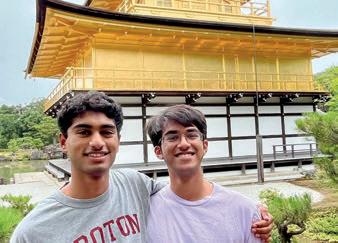

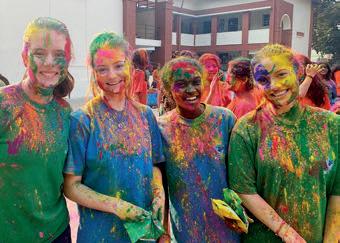
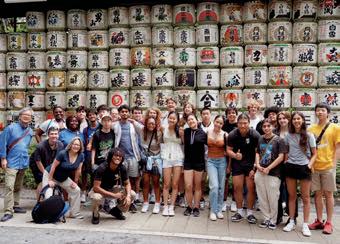
‘The reality is there are so many people who want to connect, and I think it’s up to us as educators to start making those connections and fostering those relationships.’
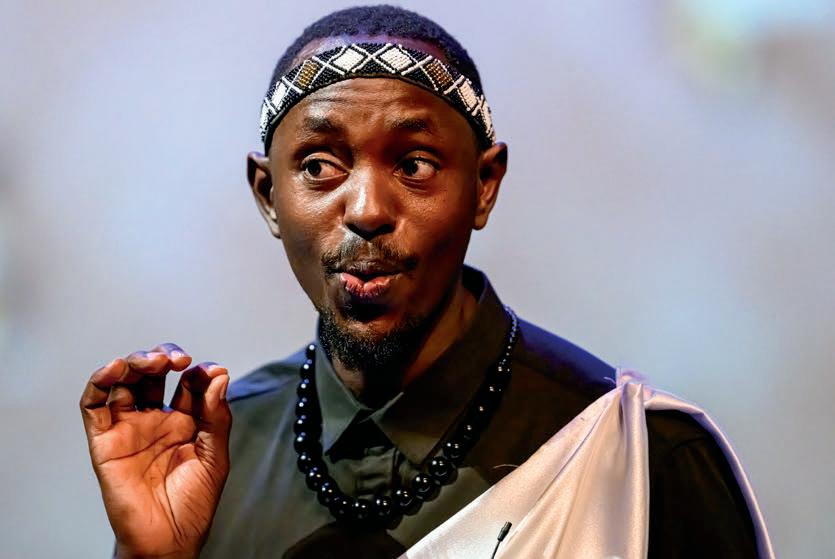
people who are not very good at responding to emails. So I think the biggest challenge was just getting everyone here. I was just very, very relieved when we finally had everyone at Groton School, and it was only a few weeks before that I was 100 percent certain everyone was coming, because even at that point people were not getting visas. We had nineteen educators and thirty-two students in total, but we were supposed to have about forty students and many of them couldn’t come because of visa problems. So I think the two big challenges were getting people here and the fact that this has not been done before.”
Around April 2023, three months out, a bit of panic began to set in. Organizers reached out to Duke University Professor Darla Deardorff, the architect of the UNESCO Story Circles methodology, for some guidance in planning. The Story Circles approach promotes sharing personal narratives and reflecting on others’ cultural experiences
and identities, fostering dialogue and understanding, and became a cornerstone for how G-PIE would take place.
“She worked with us for six weeks, meeting with us once a week over Zoom,” says Das. “It was really nice when that happened because we felt a lot more secure at the end of that process about what we were going to do.”
Besides being international, G-PIE was designed to be interdisciplinary, an approach that trickled down to the conference’s organization, too.
“We did this quickly and I think we learned a lot,” says Sales. “The Groton faculty involved all come from different backgrounds, different disciplines, and also have different experiences. So I come to this thinking, well, I produce theater for a living, so let’s produce this thing. And some of my colleagues are thinking about their classrooms and what they do in their classrooms. And some of my other
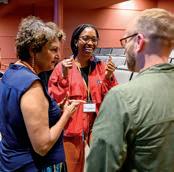



colleagues run dorms and so they’re thinking about how do we make everyone feel a sense of belonging and at home?
“At first, I think for us as a Groton faculty, that was very challenging because we all thought our needs were the most important,” she continues. “But what I realized is the planning process of this was really kind of a microcosm of what we wanted to do with these students. We didn’t realize it at the time, but I think the experience of planning this thing gave us all of those highs and lows and conflicts and challenges.
“We were having this conference so that we could help young people figure out how to not do these things, but we also have to figure that out for ourselves. So it was really gratifying and also really challenging. And then the clock was ticking because there was a day in one of our meetings where I think we all looked at each other and we were like, oh, these kids and educators are coming. It’s happening. We better get our act together. And ultimately, I think we were all inspired by that idea that there was going to be this community that we had never met before that didn’t even know it was a community yet that was going to form here in these four and a half days. And that drove us forward.”
First and foremost, G-PIE was designed to be a professional development and interdisciplinary learning opportunity for educators and students. Using the themes
of culture, water, and artificial intelligence and technology as a framework, academic workshops and cultural performances were set up to explore how different cohorts experienced each.
Besides Maqubela, who gave the keynote address, G-PIE speakers included Stephen Wolfram P’23, creator of Wolfram Alpha, and Rachelle Villalon, founder, CTO, and executive chairman of Hosta AI in Cambridge (MA), who spoke about artificial intelligence, and Manjula Salomon, recently retired associate head of school at Palmer Trinity School Miami, who shared her intercultural experiences.
Each morning started with breakfast and a walk or rehearsal, before moving on to group discussions and breakout sessions. Afternoons featured lectures on one of the themes, or cultural activities and teambuilding. Evenings ranged from a keynote speaker to an intercultural arts performance to a dance for students. On Thursday, the group traveled to Boston to explore the city together.
Beyond student-centered programming, G-PIE also offered a professional development opportunity for educators to engage in themes through a pedagogical lens. By incorporating this element of teachers learning from their peers and sometimes from their students G-PIE ensured that the lessons learned will live on at participating schools and future conferences through those educators.
Equally important, however, were the
informal interactions between students and educators alike that took place organically during the conference. In a time when anyone can video chat with someone on the other side of the globe, organizers agreed that face-to-face, personal contact between participants proved essential to the experience.
“We have, as humans, really evolved into perfecting our senses,” says Maqubela. “When I see you and talk to you in person, I feel connected to you. Whereas, when I look at a screen, there’s always that facade, there’s always something missing. In order to be authentic, we wanted to be able to be together in the same space: Eat together, sweat together, and be able to be vulnerable together.”
Despite the yearlong planning, flexibility proved to be another G-PIE tentpole.
“We told each other, reminded each other, that we needed to be flexible,” says Bannard. “And what was really remarkable is that we were able to do that. We were able to pivot every single day and say, OK, here’s where our group is right now. What can we do to make this better? What can we do to make this a richer experience for students right now?”
“While many of us who were involved in the creation, planning, and execution of G-PIE had been to numerous conferences before, none of us had ever put together anything like this ourselves,” she explained. “We had a strong structure with lots of room for flexibility. In fact, one of our
learning outcomes was, ‘Participants will practice flexibility and adaptability through communication and collaboration with others, with the intention of achieving shared goals and building empathy.’ So the very fact that we achieved that as a team indicated that we were on the right path.”
Sales says having the flexibility to alter schedules created moments of magic that could never have been planned.
“There was a moment in this conference that moved me greatly, and it was downtime,” she says. “We had had an evening of cultural performance where each group brought something, a piece of art from their culture, to share. Two of the students from the Chinese school were visual artists. And so, for the performance, they painted. We had a camera, so on the big screen you could see what they were painting. The next day right after lunch, we changed our schedule and instead of doing the activity we had planned, we pushed it back a half an hour. We set up tables. The two Chinese artists had brought supplies for all of the participants.
“There was music in our lobby and the kids came in and sat down at these tables and teachers, students, everybody was learning how to paint. I really believe that art enables, it gives people the opportunity to communicate without language barriers. And that’s what I saw. There were kids around the piano singing. There were kids drawing and learning how to draw. Some other kids sat down and learned to play a game from Rwanda. That’s not something you can do virtually. Actually, that’s where trust is built, and building trust is the key.”
G-PIE was funded through the generosity of a donor family who supported the headmaster’s (GRAIN) Innovation Fund, which assists projects and programming central to the school’s mission.
“G-PIE is a pioneering initiative to bridge the academic scholarship we cultivate on the Circle and the tangible experiences and skill sets our students will need to truly lead lives of leadership and service in the broader world,” says Trustee Nancy Yang P’18, a lead supporter of the conference. “The conference was this incredibly rich
experience for students and educators from eight countries to research and dialogue about the key social issues of AI and water, but with a focus on developing intercultural competences.
“Overall, Groton’s global education initiatives like G-PIE and GEOs help our students to develop skills to understand other cultures and work productively, as well as respectfully, in a diverse society,” she adds. “Most of the major social issues facing the world today such as climate change, water and food insecurity, and health care are all global problems which require global solutions. I believe Groton’s global education initiatives will help our students to develop the scholarship and the life skills needed to lead the way on these social issues. I hope we can continue to invest in the global education effort at Groton.”
One of the last exercises of the G-PIE week had participants writing down on an index card what they learned from the conference, what they reflected on, and what burning issue would they like to work on as a result of their experience on the Circle? Looking back, Das says he’ll look back on the relationships made as his biggest positive.
“My primary goal for this conference was for people from around the world to build relationships and partnerships through
sharing their stories and experiences,” he says. “I am thrilled to say that this objective was successfully achieved. Our faculty were enriched by the people they met, and students and teachers from around the world were buzzing with excitement at the prospect of keeping this conference alive into future years.”
“I think that over the last few years as a globe, we have realized the importance of being together,” adds Bannard. “One thing that I’ve really taken away from this conference is that we all belong to each other. All of us are responsible for the well-being of people, of not only our local communities, but also our global communities. And we’ve been trying to think about how we can help students understand that as well, that they belong to each other. One way that we’ve been able to do that is by sharing stories. And I think that if we’re going to send these students out into the world to be leaders, they need to learn to communicate with each other in an immediate way. By being together in person, that has allowed them to share art, share culture, share games, and think about their local communities and bring their perspective to everyone.
“For the longest time, I was working with names on a spreadsheet, and then all of a sudden they came in from the airport


and they were people. They were people that we could talk to and get to know. And that part was amazing. Watching students grow in confidence with each other and with themselves, both as leaders and as speakers and as tellers of stories, was pretty special.”
Maqubela says he’ll most remember the students’ smiling faces and the friendships that were developed over the course of the week.
“When I gave the keynote speech, I said globalism was nothing new,” he says. “There was globalism with some of the ugly past. I cited the trans-Atlantic slave trade. I cited colonialism. I hope they take up the challenge of reshaping a different globalism, that they take it home and say, ‘This is a time for change, a time for oneness, and a time for ubuntu.’ This is my hope.”
The hope is that G-PIE will continue, perhaps every other summer, perhaps involving a rotating roster of hosts. Organizers all agree that Groton’s first international conference only scratched the surface of what’s possible with the G-PIE model.
“There’s this desire to think about, OK, how can we move forward and how can we continue the conversation?,” says Bannard. “One thing we have told them repeatedly is please stay in touch. We hope this isn’t a one-time experience, but that these are relationships we can build on.
“This has made me think so much about how I can be a teacher that thinks beyond my classroom, beyond the Circle, and how I can pull in different perspectives, perspectives from all over the world. The reality is there are so many people who want to connect, and I think it’s up to us as educators both for ourselves, for professional development, but also for our students to start making those connections and fostering those relationships.”
As for global education overall, Groton’s team continues to grow. Besides Bannard, Julia Rowland is helping the team as it continues to consider new options. In March, GEOs will explore language immersion in France and the Classics in Italy, with GEOs
to Peru (language immersion), Scotland (theater), and Europe (student orchestra) scheduled for this summer. In addition, Groton students in the Imagine Scholar Program are visiting South Africa after a year of planning and virtual cross-cultural conversations with the original Imagine Scholars in the Nkomazi region of South Africa’s Mpumalanga province. English teacher Vuyelwa Maqubela and history teacher Midori Ishizuka are leading this effort.
“I would just say that, in my experience, whenever the students engage with other students whether it’s on a GEO or as part of G-PIE or when we have exchange students on campus I think they really love how much they have in common,” says Bannard. “And that’s something I want them to take away. I want them to know that, when they leave the Circle, they are part of a bigger world, and that I said this at G-PIE, but I think that we all belong to each other, that we are all interconnected.” •
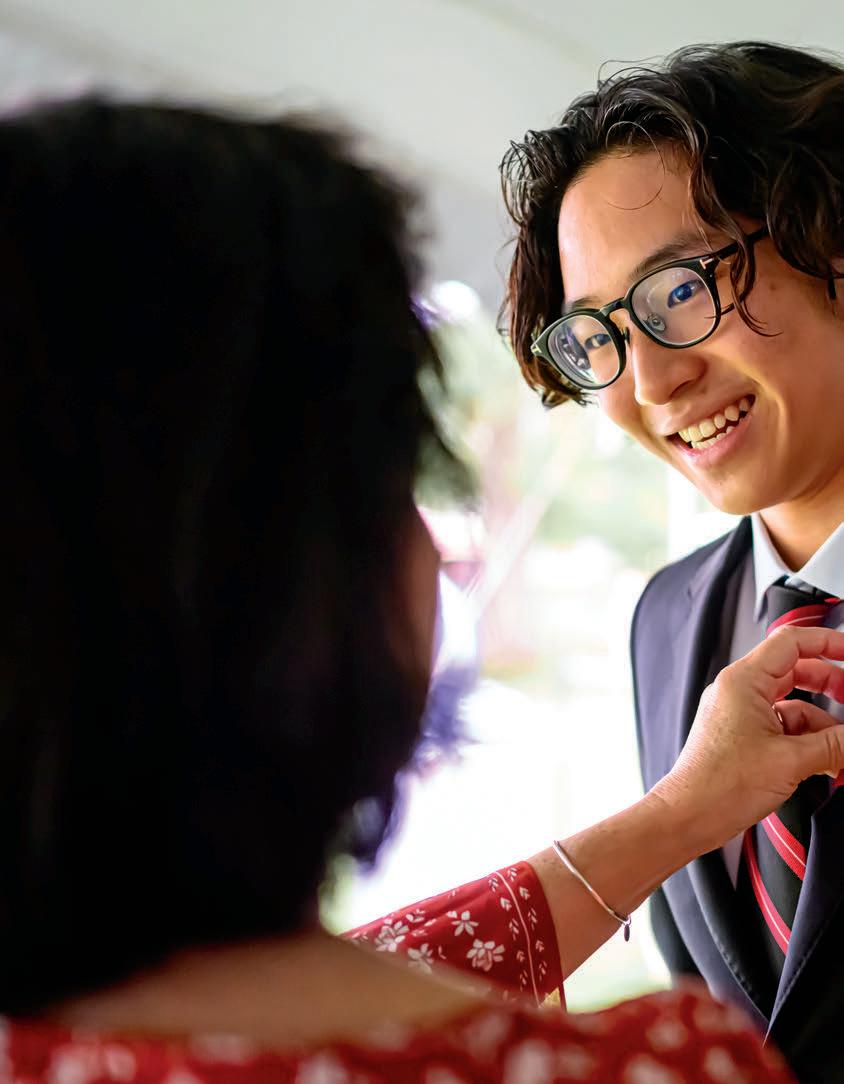
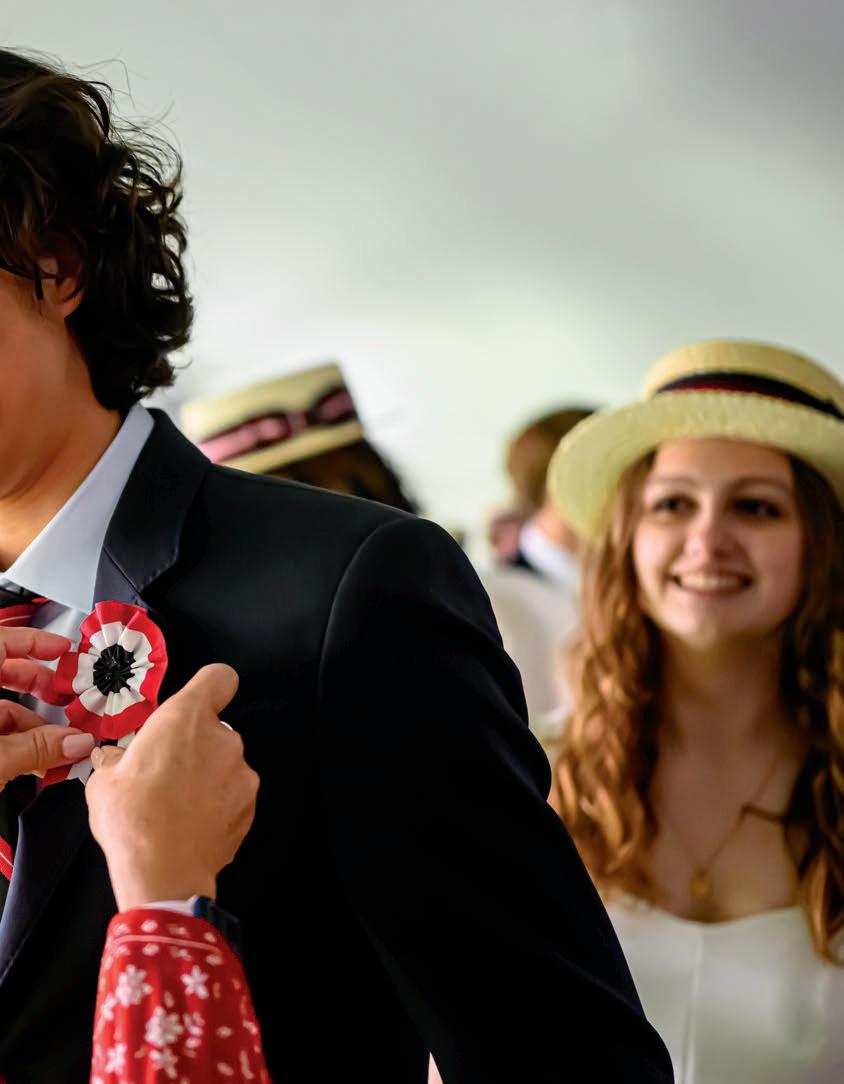
Presidential historian Jon Meacham, this year’s Prize Day keynote speaker, challenged the Form of 2023 to overcome their faults and imperfections and claim a better future by becoming people “who rejoiced in hope and were patient in suffering.”
An unseasonably cold spring day couldn’t chill the spirits of the Groton School community, as the “triumphant” Form of 2023 was celebrated and saluted at the school’s 138th Prize Day on June 4.
Ninety members of the form graduated. Following a morning service in St. John’s Chapel, the community gathered for remarks from the keynote speaker, presidential historian Jon Meacham, Board of Trustees President Ben Pyne ’77, P’12, ’15, Headmaster Temba Maqubela, and student speaker Will Vrattos ’23.
Mr. Pyne welcomed the form, their family and friends, and other students, faculty, and staff by reflecting on the rich relationships he developed on the Circle.
“The friends and relationships that one makes around this Circle really do last a lifetime,” he said. “It might not always seem evident right now or in the few years after you graduate, but I can tell you from my own experience that we’ve all made friends on this campus for life who will be there for us, in good times and in the challenging times.”
Mr. Maqubela praised the students for succeeding despite interruptions of the COVID-19 pandemic, and for seeing the challenges in front of them as opportunities.
“The triumphant Form of 2023. Here they are,” he said. “In my mind, they will always be known and remembered at this school as the form that awakened to their responsibilities. They triumphed over so much adversity and, in so doing, brought Groton back to its honored traditions.”
Graduate Will Vrattos was elected by his fellow Sixth Formers to represent them as class speaker. His wide-ranging Prize Day speech covered such topics as the struggles for fulfillment and success, rogue sleepovers in the library, the wisdom of Spongebob Squarepants, and the special bonds only formed by shared experiences, however silly they may be.
Following the awarding of prizes to outstanding form members, Pulitzer Prize winner Jon Meacham delivered the keynote. The author of several No. 1 New York Times bestsellers, Mr. Meacham has written acclaimed books about Thomas Jefferson, Andrew Jackson, Winston Churchill, George H.W. Bush, civilrights icon John Lewis, and Groton’s own Franklin D. Roosevelt, Form of 1900, and himself a Prize Day speaker in 1931, when he was governor of New York. But it was the Prize Day speech of another Roosevelt—President Theodore Roosevelt in 1904—from which he quoted in his own address on Sunday.
Special guests included Groton’s sixth headmaster Bill Polk ’58, FTR’78-’03, former trustees president Gordon Gund ’57, P’86, ’89, GP’19, ’19, ’23 FTR’76-’89, and past and present members of the current Board of Trustees. Mr. Maqubela pointed out that, prior to Mr. Polk, the ceremony was ended by an order that “The Sixth Form may go.” Mr. Polk changed that, however, using a Zulu phrase instead that has been used ever since, including on Sunday by Mr. Maqubela: Go well!
1 Ziggy Bereday and Avery Benello
2 Ayush Pillai
3 Daphne Bulley
4 Christine Chen
5 Tyler Santana, Alyssa Hummel, Clara Quinlan, Mei Matsui, Alice Liu, and Zola Sayers-Fay
6 Sam Winkler and Elizabeth Wolfram
7 Olivia Fayemi
8 Kaiden Thomas and Bensen Han
9 Avery Benello and Fiona Reenan
10 Kaiden Thomas, Zidane Marinez, Jay Adinkrah, and Osric King
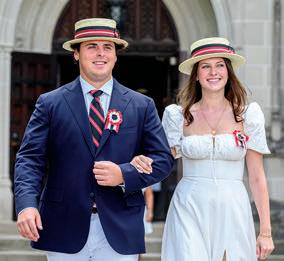




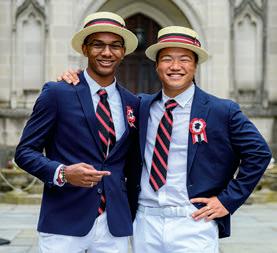

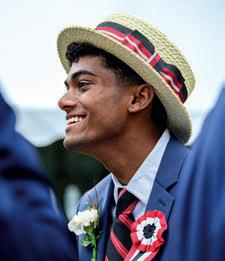
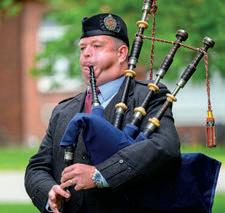
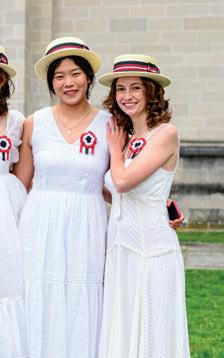


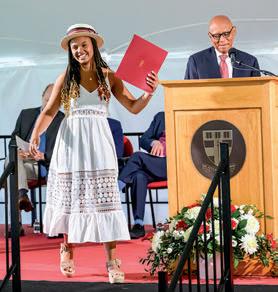
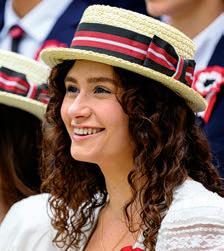


Presidential historian and Pulitzer Prize-winning author Jon Meacham delivered the following keynote address:
Theodore Roosevelt, as usual, minced no words, telling an earlier graduating class: “You are not entitled, either in college or after life, to an ounce of privilege because you have been to Groton.” TR added that you are, rather, to be held to “an exceptional accountability. Much has been given you, therefore we have a right to expect much from you.”
So said America’s twenty-sixth president. So no pressure, guys.
The world has already turned over many times since you’ve been in it. Most of you who are graduating were
born about 18 years ago. That was a time when George W. Bush was president, and The Apprentice was debuting on NBC Gas cost $1.69 a gallon. The biggest movie was Shrek 2, which competed against Spider-Man 2, National Treasure, The Bourne Supremacy, Anchorman: The Legend of Ron Burgundy, and, less grandly, The Spongebob Squarepants Movie
On television, CSI, American Idol, Desperate Housewives, Grey’s Anatomy, and Everybody Loves Raymond dominated the culture. And the Dow Jones Industrial Average was about 10,000 points. TikTok was something a clock did.
You were just beginning school when Barack Obama became the first Black president in history. You lived through the deadliest pandemic in a century—and watched as a defeated president sought to steal an election, inspiring the first insurrection against our Capitol in the history of the Republic. So you understand history; you’ve already lived through a good bit of it.
And what is one larger lesson of American history? That from the beaches of Normandy to the rending of the Iron Curtain, from Harriet Tubman to Alice Paul to John Lewis, we have made the American experiment in liberty worth defending. We are our best selves when we build bridges, not walls—when we act out of generosity, not greed—when we lend a hand, not when we point fingers.
In such moments America gets much right. And honesty compels us to admit that we also get much wrong.
How could we not? A democracy is the sum of its parts, and we— the sinful, the selfish, and the self-satisfied—are the parts.
I believe that America has a soul. In Hebrew and in Greek, soul means “breath” or “life”; it’s the essence of who we are. Your souls have been shaped by this place, by its principles and by its people, in hours of instruction and of inquiry, of joy and of sadness. And your soul, like mine and like that of the nation’s, will be an arena of contention between impulses for self and our better angels. Should those angels win just a few more than they lose, then we can move toward a more perfect union—not a perfect one, for such is impossible in a fallen, frail, and fallible world, but a more perfect one.
We stand on sacred ground. I, too, am a child of Episcopal institutions. I am a churchgoer. I keep the feast and I live in hope. And I am convinced that the Anglican tradition of which Groton is an important part has much to offer a world of polarization. Our faith is grounded in humility rather than in hubris; in recognizing that in the sufferings of the present time we can only see through a glass, darkly; and that when we fail, as we will do daily, even hourly, we are not to give up but to get up and try again. Through all the length of days, think on these things.
I do not need to tell you that the test of history awaits you. We are living in an hour of danger to American democracy. Ours is an age of declining trust and growing extremism; the
spread of lies and the erosion of truth; the primacy of an impulse for brute power and a deadly dearth of compassion and of neighborliness.
We do ourselves no favors by pretending that this is an ordinary hour of political division and of debate.
The good news is that you are extraordinary people. It is a consoling fact that Groton has prepared you for lives of entrepreneurial citizenship—a devotion to justice and to the pursuit of happiness not only for yourself but for your families, your friends, and your neighbors near and far, known and unknown.
Such citizenship has led to great change, and great change in America tends to come when engaged and creative people decide that the way things are isn’t always the way they should be, and who then form dispositions of heart and of mind to reflect the virtues of fair play and human decency.
The abolitionists who campaigned against slavery; the suffragists who fought for the ballot for women; the young who rose up from a segregated South to demand that the Jeffersonian assertion of human equality naturally applies to all, not only to some—these are your models. Study them well. Learn from them. Emulate them. If you do, you will bend the arc of the moral universe toward justice. But that arc won’t bend by itself: It requires those who insist that it swerve.
If you remember nothing else from our time together, please remember this: Be a swerver.
There is nothing more difficult to do, for democracy, remember, is the exception in human history, not the rule. Democracy only succeeds when we choose—and it is a choice—to give as well as to take. And the story of humankind from Eden forward suggests that most people would rather take than give. Democracy, then, is
forever vulnerable. Yet it is also forever possible, if we heed the lessons of conscience and of history.
And our conscience and our history tell us that the future belongs to those, in power and far from it, who insist on giving all of us what Lincoln called “an open field and a fair chance.” How do we know the future belongs to such people—the people who rejoiced in hope and were patient in suffering? Because the best of the past belongs to those who did precisely that.
If this seems overly grand or hopelessly gauzy, remember this: they did it, not so long ago, and they were just like you: flawed but devoted, imperfect but determined, few in number but strong in spirit. In that history lies our hope.
Another Groton Roosevelt, Franklin, cited his old Rector in his 1945 Inaugural Address. World War II raged still; FDR had only months to live. In his words, he offered a kind of last testament, one grounded in this place.
He said: “I remember that my old
“ Our conscience and our history tell us that the future belongs to those, in power and far from it, who insist on giving all of us what Lincoln called ‘an open field and a fair chance.’
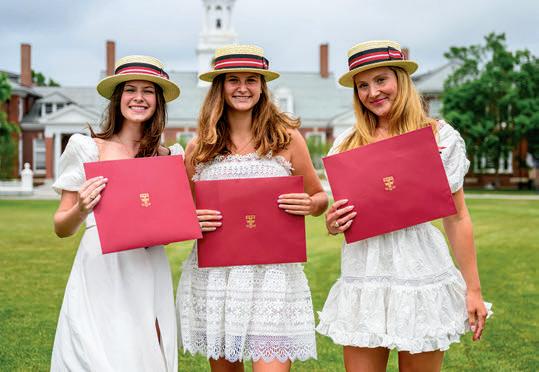
schoolmaster”—Endicott Peabody— “said: ‘Sometimes we will be rising toward the heights. Then all will seem to reverse itself and start downward. The great fact to remember is that the trend of civilization itself is forever upward; that a line drawn through the middle of the peaks and valleys of the centuries always has an upward trend.’”
The rector was right, so long as you and I remember that We the People are the motive force of that line. If we choose chaos, chaos may come. But if we choose justice, then justice may come. So let us choose wisely and well.
A final word. Here’s my advice for you, and it’s at once historically based
and heartfelt, from my advancing middle age to your youth: Please, please, please don’t let any single cable network or any single Twitter feed tell you what to think. Do that for yourself. You’ll be delighted with the results.
Be curious, be gracious, be hopeful; if you’re so inclined, say your prayers and seek the means of grace and the hope of glory; love your neighbor; take naps outside on a summer afternoon; read Jane Austen and Anthony Trollope and as many detective stories as you can find; go to the movies; subscribe to newspapers and magazines; vote in each and every election; and before you post an
“ Above all, remember, in hours of joy and of darkness, that Groton has taught you that the test of the ages is not whether you lead the good life, but a good life.Tyler Santana
opinion, think twice—just because you have the means to express an opinion quickly doesn’t mean you have an opinion worth expressing quickly.
Never be embarrassed to put your hand over your heart and join in when a band strikes up the National Anthem; write thank-you notes on actual paper—you know, the dead-tree kind. Try to look up from those phones. Above all, remember, in hours of joy and of darkness, that Groton has taught you that the test of the ages is not whether you lead the good life, but a good life. Godspeed to you all.
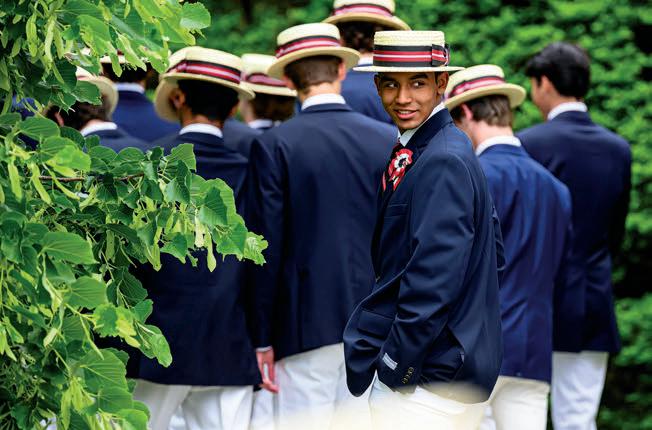

Members of the Form of 2023 chose Will Vrattos ’23 to deliver the student Prize Day speech.
Good morning, Mr. and Mrs. Maqubela, Mr. Meacham, trustees, faculty, family, friends, senior prefects, admissions prefects, D&I prefects, literary society heads, two-sport varsity captains, and field hockey managers.
I’m going to be completely honest with all of you: I’ve been enjoying my senior spring and heavily slacking off with my work ethic, and so it is entirely my fault that I wrote almost all of this between the hours of three and eight this morning while googling marine biology facts for fun. So if I
start rambling on about starfish or something … well … I guess you all just have to deal with that.
But I’ll try to keep this brief since today is a big day. The big day, and you all have a lot to do. You’ve got to thank the faculty and staff here who have helped us all so much to learn and grow. You’ve got to thank all the family members who have sacrificed so much for us to be here. You’ve got to thank your friends and tell them you love them.
What else is there to do?
You have to sit here and pretend to care about who wins all the prizes for the best usage of the library by a Third Former. And you need to give a few hundred hugs, handshakes, and uncomfortable one-armed side hugs, all while pretending you know any of the Fourth Formers. And you have to listen to the powerful, inspiring words of Mr. Pyne, and Mr. Maqubela, and a distinguished, charismatic, and highly intelligent Prize Day speaker. And Jon Meacham.
I’m kidding, of course.
I’m not actually any of those things. And as a result, I’m honestly not that qualified to be up here preaching wisdom or advice to all of you, because I’m really just not that smart. I mean, I was smart enough to get into Groton, and hopefully to make it out too, but in all honesty, I don’t know if I’m actually any smarter than I was when I came here.
Don’t get me wrong, I’ve gained some knowledge and a bit of skill at thinking, but I’m not sure how much direct, measurable improvement
upon the trajectory of my growth as a person or as a student since coming here there’s been, or at least enough improvement to quantifiably justify four years, and massive amounts of tuition cost, and being far away from my parents. And I think the same could be said about a lot of my fellow graduates today, and just a lot of the students here in general. But truthfully, the only learning we’ve done here is about ourselves, each other, and how to be good to another. And I want to try and explain why I think that’s OK, before all the parents start asking the school about a refund.
To do that, I’d like to tell you all a story, perhaps a little history lesson of sorts, and I’ll try to recount it as clearly and faithfully as I can, but if not, I’ll just cross my fingers and hope there aren’t any Pulitzer Prize–winning historians here to show me up.
That’s so awkward.
It is a story that has been told and retold many times, and I’m sure some of you have heard a version of it before, but as far as I can tell from a thoroughish search of the internet, its origin is largely attributed to a poet named Loren Eiseley.
“Once upon a time, there was a wise man who used to go to the ocean to do his writing. He had a habit of walking on the beach before he began his work.
“One day, as he was walking along the shore, he looked down the beach and saw a human figure moving like a dancer. He smiled to himself at the thought of someone who would dance for
“Your ability to embrace your crazy, dumb ideas and have fun with each other, and with me, have been perhaps the biggest way we’ve collectively made a difference here.”
the sea, and so he walked faster to catch up.
“As he got closer, he noticed that the figure was that of a young man, and that what he was doing was not dancing at all. The young man was reaching down to the shore, picking up small objects, and throwing them into the ocean.
“He came closer still and called out, ‘Good morning! May I ask what it is that you are doing?’
“The young man paused, looked up, and replied, ‘Throwing starfish into the ocean.’
“‘I must ask, then, why are you throwing starfish into the ocean?’ asked the somewhat startled wise man.
“To this, the young man replied, ‘The sun is up and the tide is going out. If I don’t throw them in, they’ll die.’
“Upon hearing this, the wise man commented, ‘But, young man, do you not realize that there are miles and miles of beach and there are starfish all along every mile? There are so many you can’t possibly make a difference!’
“At this, the young man bent down, picked up yet another starfish, and threw it into the ocean. As it met the water, he said, ‘It made a difference to that one.’”
I know what you’re all thinking: He actually is talking about starfish. Once again, deal with it.
But I think this story is relevant to the story of the kids graduating today and our time at Groton. It’s a story about someone who chooses to go up against an unstoppable force with unflinching resolve. And it’s a story of two people: an observer, and an actor.
The hero of the story is the one who chooses to act, by jumping in with no hesitation to try to make the world a better place. I don’t know if any of us have changed the world yet. But we have been asked, again and again, to do the impossible, and to make a difference when it seems like nothing we do matters at all. In fact, I would argue that that’s the point of Groton. We average between fifteen and twenty hours of classes a week, on top of five hours of homework per night for us Sixth Formers, on top of about ten hours—if you’re lucky—of athletic or artistic commitments in the afternoon. That’s about sixty hours a week of Groton without including dorm duty, check-ins, and other student leadership duties.
We have a one-day weekend and we spend that day doing homework. Fulfillment is impossible. Burnout is inevitable. And this isn’t a complaint. It’s just a fact. This school feeds us, and looks after us, and gives us the nicest possible place in which to do any of this, so it’s not like it’s super hard, or painful, or unfortunate. It’s quite the opposite. We often look and feel like we’re dancing, but at the end of the day, we’re still endlessly throwing starfish, we’re still trying to get an impossible amount of stuff done in an amount of time we just don’t have. But we manage to figure it out anyway. And we figure out how to make it fun. No
matter what we do—right or wrong— we choose to go beyond observing from the sidelines and instead actively participate in the world of Groton.
As I sought last night to participate in Groton one more time by trying to write something that I hope my classmates might enjoy, I found my way to the heart of the starfish area of the internet, landing on a quote from the most famous sea star of them all, Patrick from the award-winning series SpongeBob Deep in the throes of season four, in a teary-eyed confession to his best friend, he says, “Knowledge can never replace friendship. I’d rather be an idiot!” This is, if you read it literally, a stupid quote. And it’s from a show that many of you probably think is stupid. But if we’re honest with ourselves, at the end of the day every one of us identifies with this idea of how lovely it can be to share a moment of joy with someone just as dumb and crazy as you, and I hope that you my formmates know how much I’ve appreciated your stupidity (the good, fun kind, at least) during our time together on the Circle. Your ability to embrace your crazy, dumb ideas and have fun with each other, and with me, have been perhaps the biggest way we’ve collectively made a difference here.
Look no further to find a difference-maker like this than Robbie Trowbridge. I mean, the man has simply never said no to a good time. Late one night this winter, a few friends of mine were planning a senior sleepover in the Schoolhouse. However, it being a random Thursday night in winter term, people began to realize they had too many tests and papers to work on, and decided they had to sleep in their dorms. I begged and pleaded but, one by one, they left, until I was alone in the library to mourn the loss at a chance for some form bonding, except for the one other occupant of the library, Robbie. I lamented to Robbie in search of sympathy for the death of my golden plan, telling him how sad I was that no one wanted to sleep over with me. “Put me in coach,”
he replied, with zero hesitation and a twinkle in his eye. With no more questions asked, we spent the next six hours on the cold, hard floor, sharing our deepest thoughts and fondest Groton memories. When I woke up from our restless four-hour nap, I barely felt the aches in my back and the sleep in my head as I thought about how grateful I was that Robbie had saved my sleepover, and how much I loved his willingness to ignore our schoolwork for a night and choose idiocy, and friendship, over knowledge. I couldn’t wait to do something dumb with Robbie again. Little did I know, but I would get another opportunity just a few months later, when Larry and I set out to build a church.
We had realized that that one back there behind you was built all the way back in 1900 and, frankly, it shows. We
just kinda needed something new. But we realized we might need some help, and we thought of our favorite Maine character, who instantly agreed to take the train down from Cape Elizabeth that same day. In our excitement, however, Larry and I briefly forgot about Robbie, mistiming our arrival at the Ayer train station and picking him up an hour and a half after we told him we would. Robbie had not called or texted to complain about our lateness, and we feared for his safety, wondering if he was lost on a train somewhere in Connecticut by now. But when we got there, he greeted us with a typical smile, thanking us for picking him up and saying nothing of our arrival time. We apologized profusely anyway, since we felt terrible about our mistake, to which Robbie replied, “No, dude, it was such a good opportunity to explore.”
I appreciate you so much Rob, and everyone else in this form, since in all of your moments like these, when you’ve put fun above ambition, friendship over scholarship, you’ve made me proud to be a Groton student, and proud to be your friend. I will miss all of your foolishness, fun, and friendship, and I beg you to continue seeking out the right moments to be an idiot and make a bit of difference by giving light to the lives of others. As we prepare to leave the warm safety of our beach and throw ourselves into a swirling ocean of college, adulthood, and the rest of your lives, I thank you all for being the difference in mine. I love every single one of you—even you, Ayush—and wish you the best starting today. Good luck, congratulations, and thank you all so, so much.

1 Lucas Gordon (also pictured from left, Holly Green Gordon ‘89 and Lilly Gordon’ 21)
2 Ayush Pillai (also pictured on right, Richa Pillai ’20)
3 Amelia Pottash
4 Christina Chen
5 Hannah Mitchell
6 Donovan Turck
7 Riya Varkey (also pictured from left, Maya Varkey ’22, Layla Varkey ’15, and Rohan Varkey ‘18)
8 Bensen Han (also pictured from left, Bobby Han ’84 and Becker Han ’19)
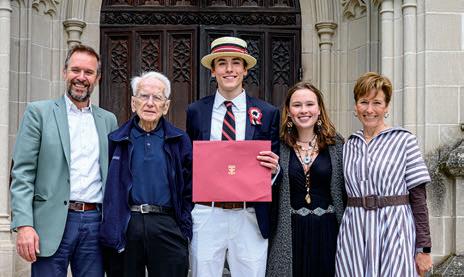
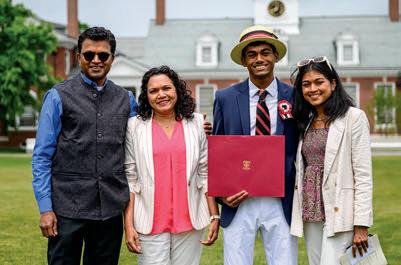
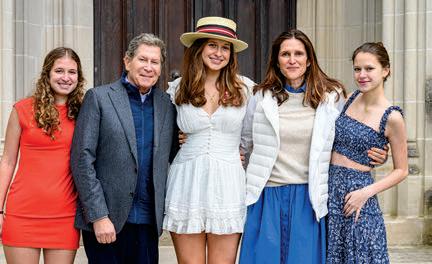

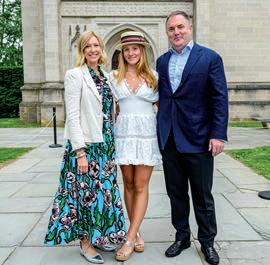

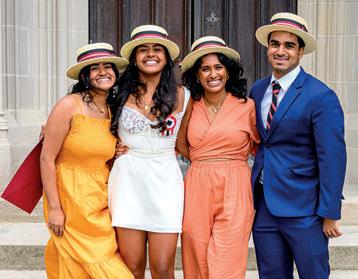
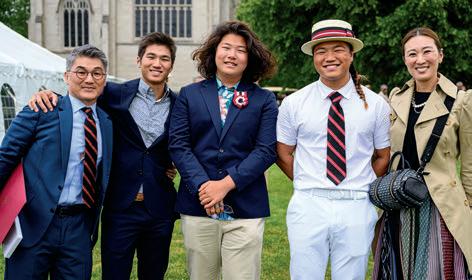
The Charles Lanier Appleton Prize
Awarded to members of the Sixth Form who have greatly served the school
Amber Stacey Gumira
Brayden Patrick Haggerty
The Asma Gull Hasan 1993 CirC le VoiC e Journalism Prize
Acknowledges outstanding leadership in creating, editing, and producing the school’s newspaper
Sophia-Nicole Petrova Bay
Joon Yeon Whang
The Tronic Award
Given in honor of Michael G. Tronic and awarded to a member of the Sixth Form who has made especially good use of the resources of the library and has shown strong interest in the life of the mind
Rowen Edward Hildreth
Will Vrattos
The Bishop Julius Atwood Literature and History Prize
Created by the late Right Reverend Julius Atwood for the best scholar in the combined fields of history and literature
Sophia-Nicole Petrova Bay
The Butler Prize for Excellence in English
Mei Charlotte Suter Matsui
The Perry History Prize
Given by Mrs. Eliza Endicott Perry to the best scholar in the field of history
Fiona Elizabeth Reenan
Zola Rose Sayers-Fay
The George Livingston Nichols Prize
Awarded for the best essay on a historical subject
Mei Charlotte Suter Matsui
The Rogers V. Scudder Classics Prize
Given in memory of Rogers Scudder, a distinguished teacher of Classics and a much loved member of this community
Colin Inkyu Kim
The Franklin D. Roosevelt Debating Prize
Given in memory of Franklin D. Roosevelt 1900 by W. Averell Harriman 1909
Rowen Edward Hildreth
Amy Handuo Ma
The Endicott Peabody Memorial Prize
Given in memory of the Reverend Endicott Peabody by the Sixth Form of 1945 for excellence in the field of religion and ethics
Zola Rose Sayers-Fay
The Isaac Jackson Memorial Prize
Awarded to the best mathematics scholar in the Upper School Lawrence Li
The New England Science Teacher’s Award
Amy Handuo Ma
Samuel Alfred Winkler
The Bertrand B. Hopkins Environmental Sciences Prize
Given by the Form of 1948
Christina Tiannan Chen
The Thorpe Science Prize
Created by Mrs. Warren Thorpe for the member of the Sixth Form who has been the most successful in developing an appreciation of the spirit and meaning of science
Yash Jain Agarwal

Trustees Adam Spence ’92, P’22, ’25, ’27 and Chandler Bass Evans ’96 with Headmaster Temba Maqubela, Prize Day speaker Jon Meacham, and Board of Trustees
President Benjamin Pyne ’77, P’12, ’15.
The World Languages and Culture Prize
Tyler Charles Bowden
Devon Isabella Mastroianni
Oliver Weston Orr
The Hudson Music Prize
Given by the friends of William Clarke Hudson of the Form of 1956 to recognize effort and progress in music during the school year
Vivan Sen Das
Bensen August Heejoon Han
Michelle Ha Jung Kim
The Choir Cup
Awarded to the Sixth Form chorister who has exhibited musical growth in sight reading and vocal technique
Samuel Alfred Winkler
Elizabeth Cawley Wolfram
The Photography Prize
Josia Marie Sulmasy
The Reverend Frederic R. Kellogg Upper School Art Prize
Given in his memory in recognition of distinguished work in art
Mei Charlotte Suter Matsui
The Dennis Crowley Drama Prize
Given by Todd C. Bartels ’01 to a member of the Sixth Form who has made the greatest contribution to the theater program
Abigail Welles Hunnewell
Rahma Ahmed Ibrahim
The Reginald Fincke Jr. Medal
Given by the Sixth Form of 1928 in memory of First Lt. Reginald Fincke Jr. and awarded to a member of the Sixth Form who has shown in athletics his qualities of perseverance, courage, and unselfish sportsmanship
Lawrence Li
The Cornelia Amory Frothingham Athletic Prize
Given by her parents and awarded to a girl in the Sixth Form who has demonstrated all-round athletic ability and has shown exemplary qualities of leadership and sportsmanship
Karenna Faith Beckstein
The Elizabeth and Margery Peabody Award
Given to a member of the Sixth Form, other than a school prefect, whose contributions to the community demonstrate sensitivity, strength of character, leadership, and integrity
Jaden Yeboah Adinkrah
The William V. Larkin Award
Given to the Groton student who best exemplifies uncommon courage and perseverance in meeting a challenge or overcoming adversity
Abigail Welles Hunnewell
The Carroll and John King Hodges Prize
Given in memory of Carroll Hodges, Form of 1905, and John King Hodges, Form of 1910, to a Sixth Former who has distinguished him- or herself in a capacity to be designated by the headmaster
Jack Henry Lionette
The Upper School Shop Prize Lindsey Rose Manugian
The following awards were presented on the Saturday evening before Prize Day:
The Gadsden Prize
Given in memory of Jeremiah Gadsden of the Form of 1968 by his classmates and friends to a member of the Fifth Form who has demonstrated inspirational leadership, encouraging social and interracial understanding in the Groton community
Daisy Yeboah Adinkrah
The O’Brien Prize
Given by the Hoopes family to a member of the Lower School who has shown qualities of integrity, loyalty, enthusiasm, and concern for others
Stephanie Yenyin Mo
The Monte J. and Anne H. Wallace Scholar
Given to a student who has completed the Fourth Form in recognition of scholastic excellence, as well as those qualities of character and commitment so important to the Groton community
Sara West Agrawal
The Laura J. Coolidge ’85
Poetry Prize
Given in her memory by her husband, Peter Touche, to a member of the Upper School who has shown a love for the power of poetic expression and a sustained interest in writing and reading poetry
Fiona Elizabeth Reenan
The Lower School Creative Writing Prize
Amanda Chang
The Heard Poetry Prize
Julie Wei Xie
The G ROTONIAN Creative Writing Prize
Given by the Grotonian Board of 1946 to a member of the Upper School for the best example of prose fiction written in the past year
Michael Q. Lu
The John Jay Pierrepont Prize
Given to the best mathematics scholar in the Lower School
Sarah Sooyuen Ku
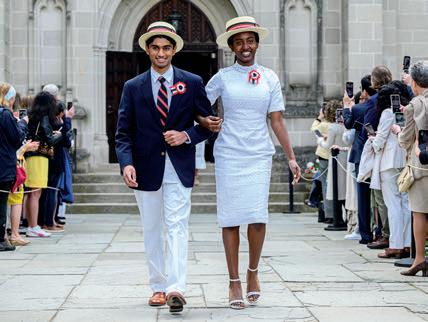

The Roscoe C. Thomas Mathematics Prize
Given by the Form of 1923 and awarded to a member of the Fifth Form for excellence in mathematics
CJ Armaly
The Fels Science Prize
Given in honor of Stephen B. Fels, Form of ’58, awarded to a member of the Lower School who has demonstrated exceptional enthusiasm for and proficiency in the experimental aspects of scientific inquiry
Stephanie Yenyin Mo
Jessica Shapiro
The Rensselaer Medal
Awarded to a Fifth Form student who has distinguished him- or herself in mathematics and science
Allen Fang
University of Rochester Honorary Science Award
Given to the member of the Fifth Form who demonstrates exceptional promise in the sciences
Aryan Mago
The Richard K. Irons Public Speaking Prize
Established in 1972 by McGeorge Bundy ’36 and Arthur T. Hadley ’42 in honor of their teacher Richard K. (Doc) Irons, presented to the student who most logically and effectively presents his or her ideas during the R.K. Irons Speaking Contest, held at Groton each spring
Arjun Ray
The Lower School Studio Art Prize
Olivia Eva Margaretha Engström
Zoe Tse Yee Yang
The Anita Andres Rogerson Dance Prize
Janice Mary Darkwah
The Harvard Book Prizes
Awarded to two members of the Fifth Form who exemplify excellence in scholarship and high character combined with achievement in other fields
The first Harvard Book Prize, given by Harry Eldridge 1920 in memory of his brother Francis H. Eldridge 1924
CJ Armaly
The second Harvard Book Prize, given by Mark A. Medlinsky ’76 in memory of his father
Eleanor Grace Taggart
The Williams Book Prize
Given to a member of the Fifth Form who has demonstrated intellectual leadership and has made a significant contribution to the extracurricular life of the school
Eric Jiakai Ge
The Jefferson Book Award
Given to a member of the Fifth Form the faculty considers to best represent the Jeffersonian ideals of scholarship, leadership, and citizenship
Jeremy Gall
The Dartmouth Book Award
Given to a member of the Fifth Form who is of strong character, has made a positive impact on the life of the school community, and has excelled in at least one non-academic area
Keira Hadley Ley
The University of Chicago Book Prize
Given to a member of the Fifth Form the faculty considers most dedicated in deep intellectual inquiry in a range of academic disciplines
Aryan Mago
The Frederick Greeley Crocker Memorial Award
Given to a Groton graduate whose record in their first three years since graduating from Groton has done honor to themself and their school
Andrew Mazza
The Potter Athletic Award
Aimee Yingying Feng
Jack Henry Lionette
Shue Zheng
The Lower School Shop Prize
Claire Travis
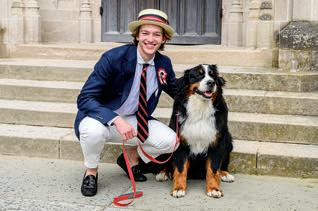
Henry Burnham
Jaden Yeboah Adinkrah cum laude
Yash Jain Agarwal summa cum laude
Sophia-Nicole Petrova Bay summa cum laude
Karenna Faith Beckstein cum laude
Avery Carpé Benello magna cum laude
Zigmund Hudson Bereday cum laude
Tyler Charles Bowden summa cum laude
Jessie Kristen Buestan cum laude
Daphne de Marigny Bell Bulley
Elizabeth Lang Burgess summa cum laude
Daniel Henry Burnham magna cum laude
Calen Ou Cagney magna cum laude
Hugh England Carlin magna cum laude
Christina Tiannan Chen summa cum laude
Lauren Sara Clark
Quinn Lyon Clubb magna cum laude
Janice Mary Darkwah cum laude
Vivan Sen Das summa cum laude
Olivia Anike Elizabeth Fayemi summa cum laude
Laurence Wilhelm August Fritze
Lucas Gallatin Gordon magna cum laude
Amber Stacey Gumira magna cum laude
Georgia Swift Gund cum laude
Brayden Patrick Haggerty cum laude
Bensen August Heejoon Han magna cum laude
Henry Benson Haskell summa cum laude
Sadie Teresa Hastings magna cum laude
Rowen Edward Hildreth summa cum laude
Robert Jungpyo Hong summa cum laude
Alyssa Rhianna Hummel summa cum laude
Abigail Welles Hunnewell
Allison Shayna Kandel magna cum laude
Edward Jackson Kaneb magna cum laude
Ronin Kaplan summa cum laude
Danielle Ann Karr
Patrick Jerome Kennedy summa cum laude
Colin Inkyu Kim summa cum laude
Michelle Ha Jung Kim summa cum laude
Osric Shaun King, Jr. cum laude
Alec Absaroka Konigsberg summa cum laude
Theodore Philip Hume Koukopoulos cum laude
Paulo Ley Duarte cum laude
Lawrence Li summa cum laude
Lucas Aloysius Li magna cum laude
Jack Henry Lionette magna cum laude
Fang Jia Liu summa cum laude
Estelle Barbara Lord cum laude
Maya Maclaren Luthi summa cum laude
Amy Handuo Ma summa cum laude
Lindsey Rose Manugian magna cum laude
Zidane Ahmed Mariñez cum laude
Devon Isabella Mastroianni summa cum laude
Mei Charlotte Suter Matsui summa cum laude
Charlotte Marie Maturo
Kyra Nicole Minda Chiriboga cum laude
Hannah Catherine Mitchell cum laude
Aidan John O’Connell magna cum laude
Oliver Weston Orr summa cum laude
Michael William Pelletier cum laude
Ayush Pillai summa cum laude
Henry Weldon Pomeroy cum laude
Amelia Arden Pottash cum laude
Clara May Quinlan
Fiona Elizabeth Reenan summa cum laude
Luke James Romano cum laude
Tyler Matthew Santana magna cum laude
Zola Rose Sayers-Fay
summa cum laude
Rebecca Baptista Serodio
summa cum laude
Jasper Liu Sharma
summa cum laude
Rose Marie Shingles cum laude
Josia Marie Sulmasy cum laude
Kaiden Michael Thomas cum laude
Jack Patrick Travis
magna cum laude
Robert Gilmore Trowbridge cum laude
Donovan Daniel Turck
magna cum laude
Riya Chacko Varkey
magna cum laude
Dylan Thomas Vigue
Will Vrattos
magna cum laude
Frances Katherine Waltz cum laude
David Wang
summa cum laude
Charlie Tai-Jie Feng Weisberg
magna cum laude
Joon Yeon Whang
summa cum laude
College Number attending
University of Chicago
Boston College
Brown University
Georgetown University
Tufts University
University of Pennsylvania
Dartmouth College
Yale University
Bowdoin College
Harvard University
New York University
Northwestern University
Stanford University
Syracuse University
University of Massachusetts Amherst
University of Southern California
University of St. Andrews
Vanderbilt University
Amherst College
Barnard College
Carleton College
Carnegie Mellon University
Claremont McKenna College
Clemson University
Colby College
Samuel Alfred Winkler
magna cum laude
Elizabeth Cawley Wolfram
summa cum laude
Kiefer Murphy Wood
magna cum laude
Julie Wei Xie
magna cum laude
Brianna Ya Zhang
magna cum laude
Zhining Zhao
summa cum laude
Aimee Yingying Feng Shue Zheng
summa cum laude
Chloe Yixiao Zheng
summa cum laude
Colgate University
College of the Holy Cross
College of William & Mary
Connecticut College
Drexel University
Furman University
Harvey Mudd College
Howard University
Massachusetts Institute of Technology
Northeastern University
Pitzer College
Pomona College
Princeton University
Santa Clara University
Smith College
St. Lawrence University
Trinity College
Union College
University College London
University of California, Berkeley
University of Miami
University of Vermont
University of Wisconsin-Madison
Washington and Lee University

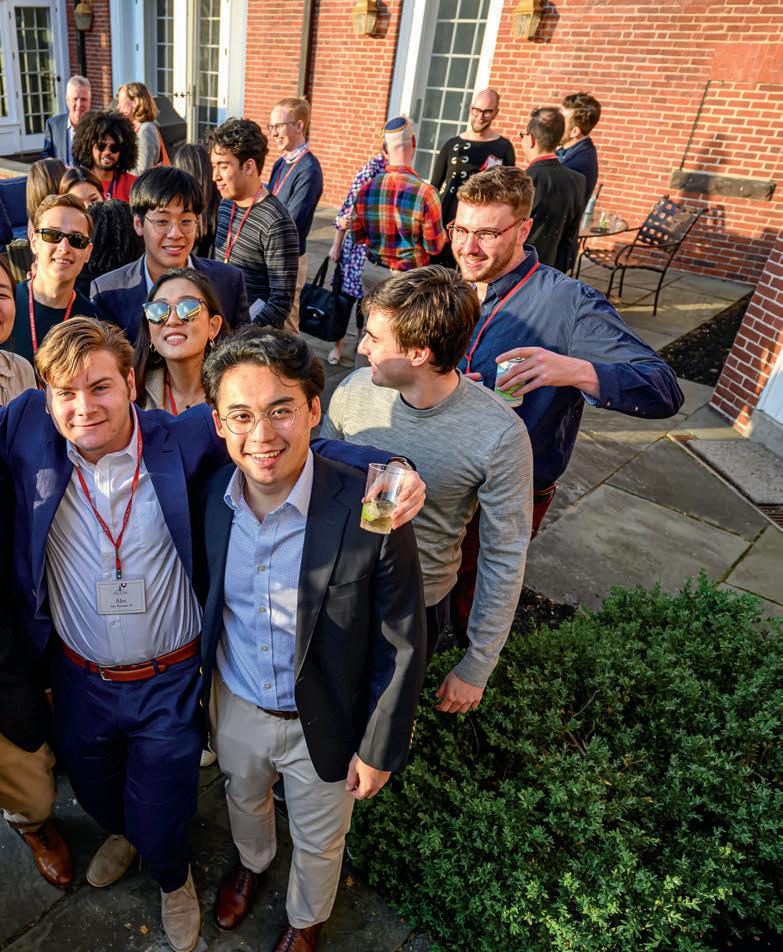
Members of the Form of 2018 gather for the reception at the Headmaster’s House on Friday evening of Reunion Weekend.
MORE THAN 350 Groton alumni and their families returned to the Circle May 19–21 for Reunion Weekend.
This year’s Reunion Weekend celebrated alumni from form years ending in three and eight, with the oldest representing the Form of 1953 and the youngest the Form of 2018.
Alumni from twenty-nine states, as well as Canada, France, Germany, Hong Kong, Thailand, Mexico, and the United Kingdom made the trip back to Groton. With their families, more than 500 people attended the event.
Weekend activities included tours, receptions, dinners, presentations from the Board of Trustees and Admissions Office, open classrooms, musical performances, a visual arts showcase, and a special alumni Circle Book Club event featuring Julia Halberstam ’98 and Curtis Sittenfeld ’93
Headmaster Temba Maqubela delivered his state-of-the-school address, and alumni awards were given to Tom Bannard ’03 (Cui Servire Est Regnare Award) and Anne Mosle ’83 (Distinguished Grotonian).
Rain on Saturday afternoon might have brought out the umbrellas but could not dampen spirits on this warm, welcoming weekend.
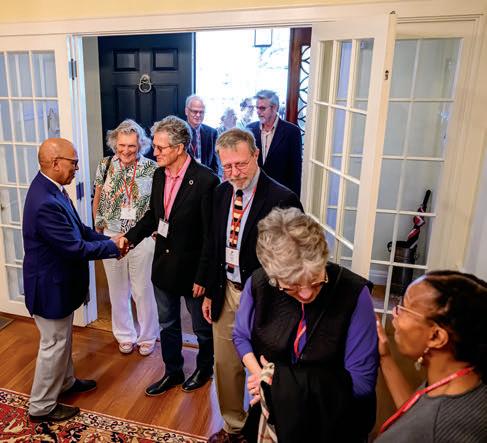




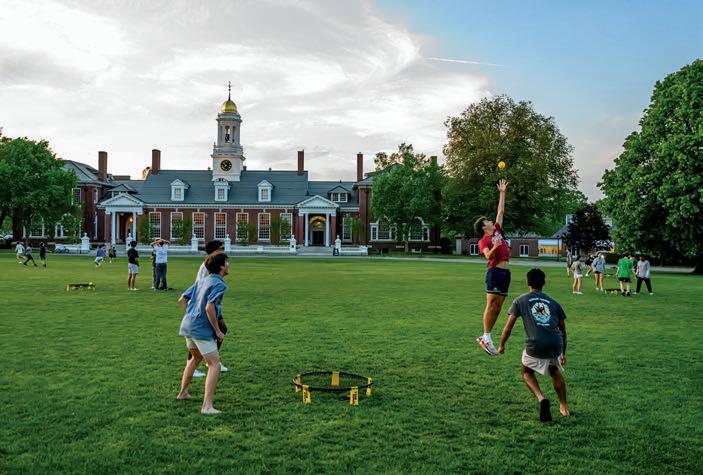
Thanks to all the alumni who returned to the Circle for Reunion Weekend! Forms ending in 4 and 9, mark your calendars for May 10–12, 2024.

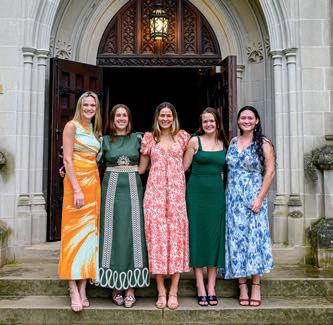
1 Panelists and moderators of the Business Management Club event on Friday: Sarah Barnes ‘83, Avery Benello ‘23, Ziggy Bereday ‘23, Tucker Golden ‘93, and Sarah Stuart ‘83
2 Members of the Form of 2018, Annie Colloredo-Mansfeld, Addie Newsome, Layne McKeown, Olivia Potter, and Elle Despres
3 Katharine Wolf ‘98 greets Hiram PowersHeaven ‘98
4 JJ Cheng, Noah Aaron, Ben Cardinal, Jayton Oei from Form of 2018
5 Danielle Núñez ‘98 and her family
6 Curtis Sittenfeld ‘93, interviewed by Julia Halberstam ‘98
2 A 1999 clan catching up: Aaron Snyder, Raksmey and Herman Gaskins, Amy Baughman, and Alston Ramsay
7 Chris Kennan, Lydia Winter, David Kellogg, Bob Gannett, and Alec Steele from the Form of 1968
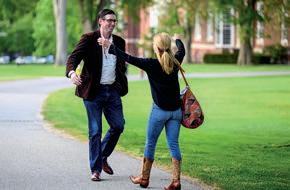
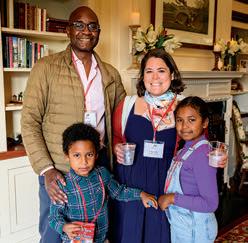


8 Layne McKeown ‘18 and Vuyelwa Maqubela
3 1989s Zack Gund, Roland Reynolds, Peter Everett, Jeff Kim, Jed Webber, Gar Ragland, Lucas Hatch, Hylton Jolliffe

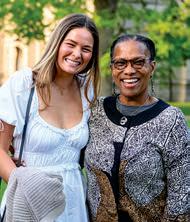

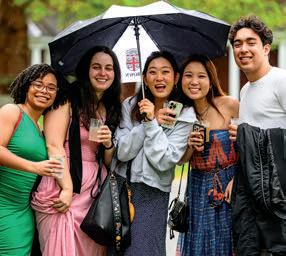


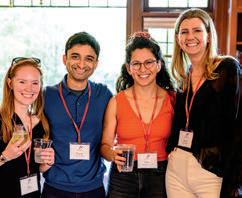
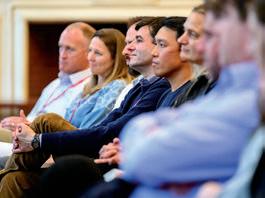
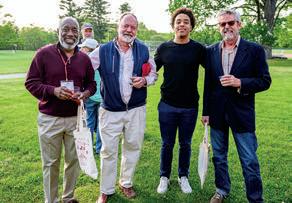
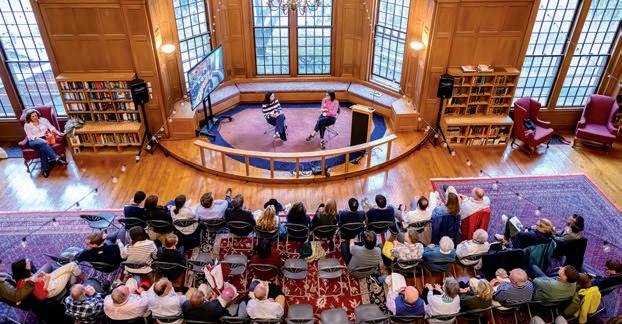
9 Ivar and Patricia Schacke ‘58, David Bingham ‘58, Ben Bingham ‘68, Martha Case, Patricia Case W’58
10 Members of the Form of 2018: Imani McGregor, Kate Hyde, Sangah Lee, Min Shin and guest
11 Alumni children enjoying the dessert bar!
12 Elle Watson, Pranay Sharma, Maria Jose Herrera, and Maeve Hoffstot, members of Form of 2013
13 Members of the Form of 1993 listen to fellow formmate’s Circle Book Club talk with autor Curtis Sittenfeld ‘93
14 Caroline Brage ‘98, Letita Hall Johnson ‘98, and India Foster ‘98
15 Joey Odim ‘73, Angus West ‘73, Emmanuel Odim, Japes Emerson ‘73
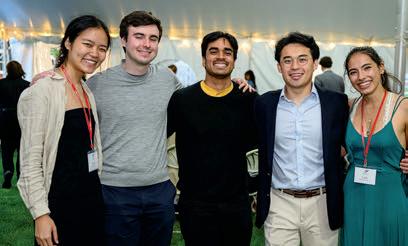
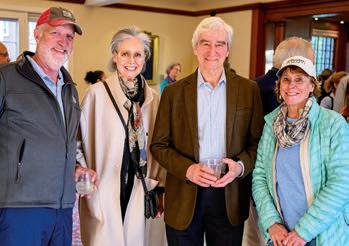

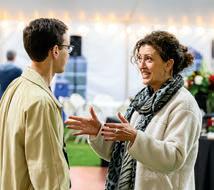
3 Thomas Steere ‘18 with Meaghan Wiggin Osumane Malik Gaye ‘18, Yan Davidoff ‘18, and Roselle Lovell-Smith ‘18
4 Faculty member Rebecca Stanton P’09 speaks with a former student
5 Anne Mosle ‘83 and husband Jim Whitney
6 Noelia Carbajal ‘18, Headmaster Maqubela, and Layla McDermott ‘18
7 Layla McDermott, Andrew Rasetti, Ethan Walsh, Aiden Reilly, Elechi Egwuekwe, Greg Segal, and Alex Waxman from Form of 2018

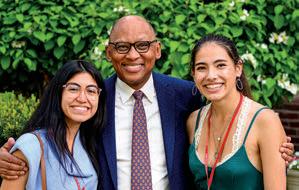
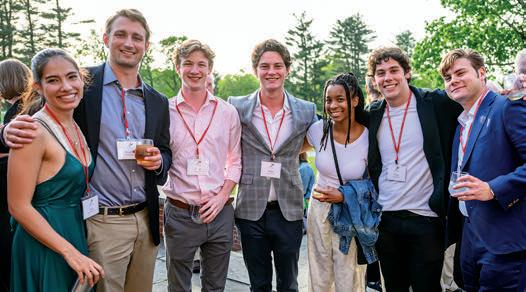
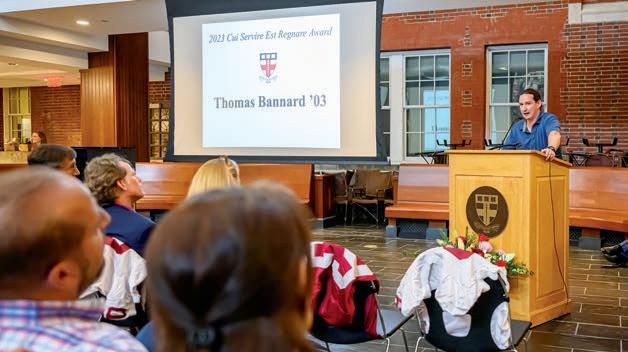
Tom Bannard ’03 received the Cui Servire Est Regnare Award named for the school’s motto, which celebrates a long-engrained ethos of service for his inspired leadership in the field of recovery.
Tom accepted the Cui Servire Est Regnare Award with these words:
Thank you, Temba. I am honored to receive this award at a place that has shaped so much of who I am.
Temba kindly left out the part where my own addiction wrought havoc on my own well-being, my relationships, my life, and my career a little over sixteen years ago. When I found myself facing a lengthy jail sentence, needing to drop out of college, and in serious physical danger, I was very fortunate to be introduced to a man who had struggled with his own substance use. Though he was forty years older than me and had drank church wine and beer, rather than my cocktail of amphetamines, liquor, and cannabis, I identified strongly with his past relationship with substances, which had robbed
him of relationships, his purpose and nearly his life. Bill introduced me to a community of recovery that changed and shaped my life even more than Groton did.
I share this to explain a bit why I have always been open about my recovery journey. Apart from the fact of my felony conviction being public record, the reason that Bill was able to intervene in my life was because he had shared his own recovery journey with his boss, the headmaster of a private school. I strongly believe that I would not be alive, much less have had the wonderful life that I have had, without the combination of his courage to be open and the community that allowed him to be his whole self in the workplace.
I’m also not sure that I would be alive without the quality of care that I received upon entering treatment, which I soon discovered was the exception rather than the rule in America. I have come to understand that my own addiction, followed by my inclusion in communities of recovery, have been the most important gifts in my life, and have given me back relationships and a clarity of purpose that has deepened and become more meaningful than my life prior to my addiction.
I began my recovery journey in 2006. At that time, U.S. overdose deaths were the highest per capita rate in recorded history. Since then, despite my own and many other advocates’ efforts, overdose deaths in the U.S. have quadrupled, as the U.S. entered its second century of failed drug policy focused on prohibition and mass incarceration driven by the politics of racism and
(continued on next page)
(continued fom previous page)
dehumanization. It is an incredibly complex challenge, toward which we have continued to press a simple, violent, and incredibly ineffective solution focused on blame and punishment.
As I consider ways in which we first reduce, interrupt, and eventually heal from this tragedy, I keep thinking about Sonya Clark’s work, “Unraveling.” Clark, a Black fiber artist, invited members of the public to help her deconstruct a Confederate flag thread by thread. While many came attracted by the idea of destroying a Confederate flag, the process of deconstructing the flag one thread at a time, like the deconstruction of racism in America, is a careful and challenging process, as will be the rebuilding of something new from the materials at hand.
I find this emblematic of many of the complex and important issues facing our world today. These challenges require those of us with the gifts of education and resources to utilize these gifts to build a better community, always keeping those most impacted at the center of these movements.
A value that I have learned from my recovery journey is that “gratitude” is an action word, and if I am grateful for the gifts that I have received then I have a responsibility to make them possible for others. I hope that our gratitude allows us to move beyond awareness of suffering, and into a space of proximity to hardship, relationship with those most impacted, and a responsibility to alleviate the suffering of others.
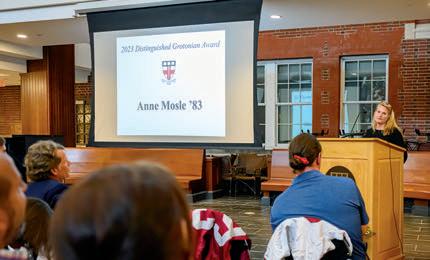
Since 1977, Groton School has presented the Distinguished Grotonian Award to a graduate whose life of highly distinguished service reflects the essential values of the school. This year’s Distinguished Grotonian, Anne Mosle ’83, is a recognized leader in building pathways to opportunity for low-income children, women, and families, especially through her work at the Aspen Institute.
Anne accepted the Distinguished Grotonian honor with these remarks:
Thank you, Headmaster Maqubela, for your kind and generous words. I am extremely honored to receive this award and would like to express my appreciation to you and the entire Groton community of students, alumni, faculty, and administration. I also would like to congratulate Thomas Bannard as the 2023 Cui Servire Award recipient which celebrates his inspiring courage and commitment to service. And, before I begin my remarks, of course a special shout out to the Form of 1983.
I accept the 2023 Grotonian Distinguished Alumni Award with
an abundance of humility. When Temba called me with this news, I had just returned from a month in South Africa and Rwanda, where I had been co-leading two programs for diverse U.S. leaders with the shared purpose of advancing racial, gender, and economic equality. As we spoke, I must confess that I experienced a swell of competing emotions ranging from startling surprise to a warm connection. I paused for a moment to reflect, especially as the first woman to receive this award.
If we go back to Prize Day of June 1983, it would be quite fair to say that
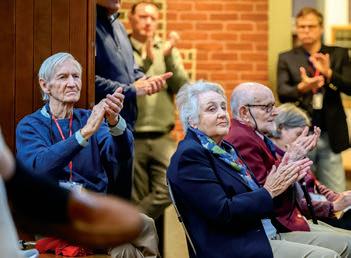
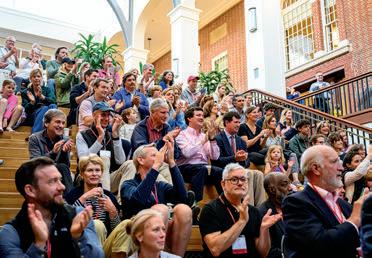
if there was a survey then of the person most likely to receive this award, I would not have been on the list. It is an important reminder to me as I embrace a mindset that “anything is possible” and that there are many seasons in life. The ups and downs of our experiences test us and shape our values and purpose in life.
As I reflect on 139 years of Groton’s history, Temba, it is you that I believe is most deserving of the term “distinguished.” Your vision, intellect, and inclusive spirit are exceptional gifts, and your leadership has guided and enhanced this very special and highly privileged institution to take the best of its history and evolve with the times to strengthen and prepare Groton for a flourishing future. It is a rare leader that can stand in the now, understand the past, and most importantly, guide an institution into the future as you have done with such clarity and success.
So many places and people shape and guide each of us. I would like to center this moment in gratitude and generosity and recognize a few people who gave so generously of themselves when I was a student here.
First, I owe a lot to Mr. Choate ’60 for his teaching, coaching, and unwavering support. I had the good luck of playing on an incredible ice hockey team, led by spectacular talents
like Char Joslin ’85, Bunny Forbes ’82, and others. While I was far from a star, Mr. Choate created an esprit de corps that celebrated each of our contributions. I bring that to my work now, knowing that accomplishing anything of meaning is a team sport and always a collective effort.
I would also like to thank Mr. Smith for his encouraging ways. He sparked an appreciation for chorus and the Chapel experience—just as Mr. Gula transformed Latin into life. I am grateful for the dedication of all the faculty who with patience and high expectations help each student to learn, stretch, and see the possibilities that surround us.
Over the past forty years, I have been the recipient of so much generosity. So many people, including Groton alumni, have shared their wisdom freely and opened doors to new possibilities. I have been blessed with a supportive, loving and, when needed, tolerant family, especially my husband Jim Whitney. And I’m grateful to my parents, Fay and Bill Mosle ’52, who instilled in me the importance of hard work, community service, and treating everyone with respect.
While I am honored by this award today, I believe that leadership lies in all of us, and we are all life-long learners. At the Aspen Institute, I work
with amazing people taking on some of the most critical issues, from economic inequality to climate justice with a shared commitment to making a better world for all. We swing for the fences and invite diverse and different points of view.
Change is hard; yet possible— especially if our North Star is clear. My North Star is to advance intergenerational economic opportunity for all and ensure that the people most proximate to and disproportionally impacted by systematic inequity are included in decision-making and governing alongside powerful positional leaders. We need to tackle our challenges in new ways if we are to discover new solutions.
A lot has been poured into me, and I will continue to do my best to pay it forward. The magic of the Groton Circle comes to life each year with new and returning students as well in the hearts and minds of the alumni community. This weekend, the Circle welcomes us back. Temba, with your leadership, I know that Groton’s future is ever brighter; and Groton will not just meet each student where they are but will meet them where they dream. With heartfelt humility, thank you, and I wish everyone a wonderful weekend of connecting with both new and longtime friends.
1 Chinedu Okorafor ‘13, Louisa Johnston ‘13, Ellee Watson ‘13, Analia Del Bosque ‘13, LuAnn Polk, Cher Lei ‘13
2 Jon Lozier ‘73, Tizzy Hatch, Whitney Hatch ‘73, and Laura Peabody
3 Bryan and Martha Kim ‘98, Kia Washington ‘98, and Danielle Núñez ‘98
4 Eric Ge ‘24, Max Fan ‘25, and Brittany Deng ‘24 perform during the Ned Gammons Memorial Recital
5 Annie Colloredo-Mansfeld ‘18, Alyna Baharozian ‘18, Layne McKeown ‘18, Elechi Egwuekwe ‘18, and Maggie Cheever ‘18






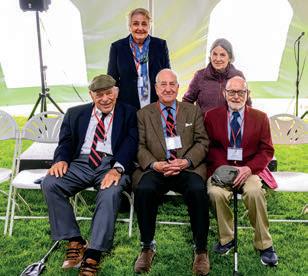
Front row: Dwight Minton, Laury Perera, David Rhinelander
Back row: Elizabeth Perera, Ann Rhinelander
Front row: Barbara Dailey, Wallace Dailey, Patricia Case, widow of Jim, and their daughter, Martha, Bill Polk, LuAnn Polk, Sandra Schmidt, Jake Cooley, Richard Rand, Elizabeth Rand
Middle row: Sloan Simmons, Wick Simmons, David Bingham, Ed Robbins, Tom Schmidt, Ivar Schacke, Patricia Schacke
Back row: Tom Wright, Davis Pike, Lynne Waterston, Sam Waterston
In attendance but missing from the photo, was our host, John Maynard, who was off to get ready for our invasion!


In attendance, but missing from the photo, were Alec and Marnie Kerr
Front row: Chris Loring, Ben Bingham, Thomas Higginson
Middle row: Chris Kennan, Andrew Capitman, Lydia Winter, Terce Dines
Back row: David Kellogg, Alec Steele, Bob Gannett
Front row: Rick Doyle, Jon Lozier, Laura Peabody, Cy Vance, Japes Emerson, Greg Pleasants, Fred Morgan, Joey Odim, Pat Beilman (Poor), Larry Hyde, Janice Thacher
Second row: Adam Thacher, Bill Sheeline, Tom McHenry, Sam Hoar, David Gardiner, Angus West, John King, Rick Chadwell, David Poor, Mike Klebnikov, Win Warren, Proal Perry, Connie Perry
Third row: Chris Noll, Tizzy Hatch, Marko Fong, Betsy Gardiner, Cathy Lavelle (Eagle), Scott Blanchard, Emmanuel Odim, Peter Storey
Fourth row: Nick Williams, Whitney Hatch, Fred Whitridge, Bob Peabody, Frank Eagle

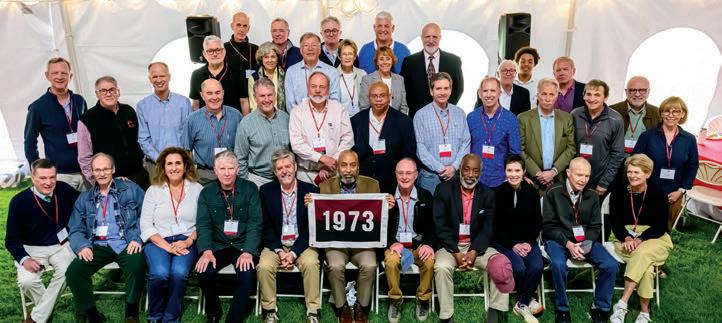

Front
Middle row: Catherine Eliasberg, Herb Smith, Jennifer Gotti (Charles Gardiner’s partner), Tom Jessiman, Grant Rogers
Back row: Greg Maffei, Peter Eliasberg, Charles Gardiner


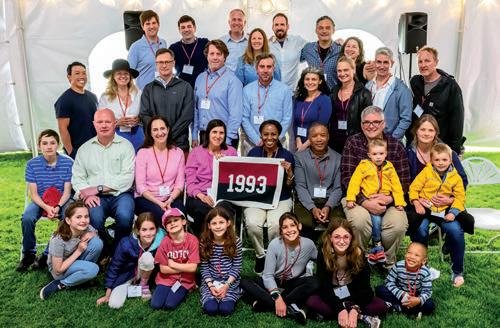
Front row: Sarah Barnes Jensen, Adrian Jones, Ted Miller, Tyrone Void, Sarah Phillips, Sarah Eaton Stuart, Margaret Rhinelander Rizzi, Thad Bereday
Back row: John McHenry, Ted Little, Fab Rasetti, Anne Mosle, Rudi ColloredoMansfeld, Greg Keating, Elizabeth Gardiner, Thatcher Adams
Front row: Lydia Cottrell, Evans McMillion, Stuart Murray, Ed Eglin, Elizabeth Graves
Back row: Karen Ford, Ann McGowan, David Manugian, Steve Theobald, Laura Bradford, Erik Casperson, Gillian Thompson
Also in attendance over Reunion Weekend but not pictured - Josiah Brown, Scott Cashen, Tim Choate, Mike Kearney, Gen Matsui, Ted Polubinski, Ben Powell, Steve Robert, Ben Smith, Sam Spackman, and Marie Banerjee Walsh
Front Row (children): Caroline Atwood, Annika Tripp, Annabel Kent, Zoe Kent, Evie Kent, Eliza Tripp, Evan Kane
Second Row: Peter Atwood, Peter Atwood III, Sarah DiMare Atwood, Curtis Sittenfeld, Yvette Ross Kane, Ed Kane, Jake Guswa, Henry Guswa, Emily Guswa, Benjamin Guswa
Third Row: Brendon Chiou, Catherine New, Alex Donn, Matt Richards, Peter Hegener, Tanya George Kent, Kate Demong, Zack Tripp, Gordon Lang
Fourth Row: Hammy Hadden, Tucker Golden, Will Webb, Sarah Webb, Josh Hubball, Victor Nunez, Jen Kim Cutie

Second
Gena McGhee and Paul Council, Ellie Berlin Stover with Brooke, Elizabeth Pyne Singer with Wilhelmina, Julia Halberstam with Bea, Alison and Joshua Crites with Josephine and Louisa, Xavier and Gabriella McDell (children of Danielle Núñez), Katharine Wolf
Third row: Heather Brigham and Dan Wilson with twins Jett and Sydney Brigham-Wilson and Stella Wilson, Martha Kim with Romy, Meredith Bowen, Isabelle Kinsolving Farrar, Christina Maloney, Melanie Broad Seymour, Kia Washington, Zena Valencia Sanders, Danielle Nunez, John Rossi, Andrew Ferrer
Fourth row: Larrison Campbell, Caroline Braga, Letitia Johnson, India Foster, Peter Dowling, Latoya Massey, Meg Thomas and Charley Aldrich with Daphne and Leo, Jeff Wolf, Rylan Hamilton, Jamaal McDell, Dillon Bryan
Fifth row: Alexandra Scott Amorosi, Kris Pitney, Gardner Ellner ’99, Nate Amory, Alex Farmer, Hiram PowersHeaven, Joe Burnett, John Roberts
First row: Nick Roper, Lily Lyman, Louisa Collier Gehring, Sarah Thorndike Kelly, Ben Flatgard
Second row: George Razook, Patrick Mott, Tom Bannard, Caroline Hoch, Cabell Belk, Caroline Hamilton Langerman, Caroline Wilson McDonald, Caleb Kelly
Third row: Tes Siarnacki, Buck Fletcher, Devin Demers, Nick Benoit, Mark Butler
Fourth row: Stephanie Boulet, Ned Henry, Henry Higginson, Sarah Guy, John Nagler, Nat Bacon

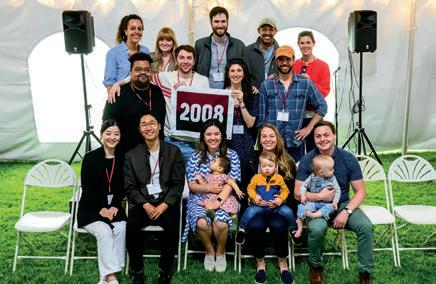

Front row: Jackie Kim and Chris Ahn, Josephine Ho Madhok, Dee Ezzio, Brendan Fogarty
Middle row: Rodney Smith, Ward Goodenough, Caroline Boes, John Goodlander
Back row: Ceci Nicol, Catie Baumgartner (friend of Ward Goodenough), Daniel Blank, Tyler Rodriguez, Emma Curtis Goodlander
Front row: Naomi Primero, Analia Del Bosque, Chinedu Okorafor, Frederico Marchese, Ellee Watson, Pranay Sharma, Alice Stites, Maria Jose Herrera
Middle row: Nimesha Gerlus, Chris King, Louisa Johnston, Sam Watson, Maeve Hoffstot, Lucy McNamara Hill, Catherine Walker-Jacks
Back row: Meghan Harvey, Monifa Foluke, Starling Irving, Nick Funnell, Ryan Meuth, Christina Napolitano, Cher Lei, and Ihu Erondu
Front: Nina Norton, Arabella Peters, Claudia Oei, Imani McGregor, Sangah Lee, Min Shin, Noelia Carbajal, Becky Zhang, Lucy Chatfield, Daisy Fey, Elechi Egwuekwe, Vuyelwa and Temba Maqubela, Mary Sabatelle, Maggie Cheever, Kate Hyde, Yan Davidoff, Layla McDermott
Middle: Ethan Walsh, Greg Segal, Tim Hoopes, Aidan Reilly, Roselle Lovell-Smith, Layne McKeown, Annie Colloredo-Mansfeld, Elle Despres, Olivia Potter, Addie Newsome, Christian Carson, George Altshuler, Alex Waxman
Back: Eric Yang, Jayton Oei, George Zhai, Malik Gaye, Paul Malone, Nick David, Randeep Grewal, Cam Schmitt, Andrew Rasetti, Tom Steere, Myles Maxson, Alina Baharozian, Ben Cardinal, Charlie Vrattos

 by Rowen Hildreth ’23
by Rowen Hildreth ’23
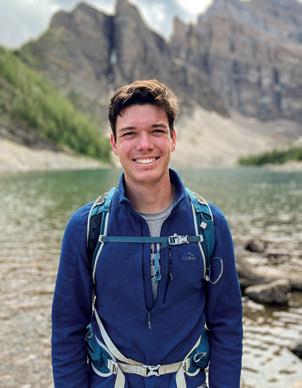
“It’s impossible. There’s no way that Lee Harvey Oswald killed JFK. It had to have been a conspiracy.
“He had a lot of enemies, you know. The CIA, the Soviets, the mob—he had to distance himself from Frank Sinatra after he was elected, because Sinatra was so tight with the mafia. The media wouldn’t tell you that, though, just like they wouldn’t publicize the stream of women coming through the White House.”
Mr. Fauchier mockingly continued, “‘Jack Kennedy: family man.’ Can’t jeopardize that image when you’re fighting the Russians.
“Anyways,” he said, putting on an agreeable face, “what progress have you made on Citizenship in the Community?”
I stared at him across the small library table. I couldn’t believe that this was the man who I’d be working with every week for the next three years. You see, Mr. Fauchier was the merit badge counselor for five of the fourteen merit badges required for the rank of Eagle Scout. This meant that if I wanted Eagle Scout, I needed to get these merit badges, and to get these merit badges I needed his signature. So, there was no choice but to put up with him.
Unfortunately, these five merit badges happened to be the most political merit badges in all of Scouting. I quickly learned that Mr. Fauchier’s political tangents were a weekly occurrence, as he launched into tirades against the Democrats, liberalism, and taxation week after week. I was powerless to speak up; after all, I couldn’t jeopardize my own goals. I felt like saying something, to him or another adult, but I was worried that that would actually get me into trouble instead of him. So time went on and I learned to grit my teeth.
This story paints a very negative picture of my time as Scout, and I want to clarify that, while this story is true (and not even the full extent of his antics), I’m grateful for the skills I’ve learned, the friendships I’ve strengthened, and the memories I’ve made through Scouting. It’s fundamentally a wonderful organization and I hope that my troop extends its hundred-year tradition for many years. But that’s not what I’m bringing you today. Instead, I want to use my chapel talk—this rare
“ I need to proceed with the caveat that you can really love something and still recognize the faults it has. You know you love something especially when you can recognize its problems.
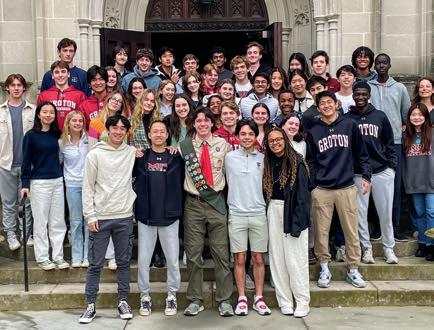


opportunity to have an all-school platform—to talk about what I’ve learned about navigating daunting institutions and ultimately how to change them for the better.
In order to do this though, I need to proceed with the caveat that you can really love something and still recognize the faults it has. You know you love something especially when you can recognize its problems.
And of faults Scouting has plenty, but there are two domains that broadly separate them: my interactions with adults, and with my peers. While I was having trouble with Mr. Fauchier—the adult side—things were far worse for me as a new Scout.
My first summer at Scout camp was rough. There were a lot of things that marked me as an outsider—I was one of the youngest Scouts, I was still outspokenly liberal (in a very conservative organization), and I was going through an awkward phase of adolescence. The older Scouts that year happened to be especially meanspirited, and since Scouting places a big emphasis on youth leadership they had near-absolute control over me and my friends. Despite supposedly having the integrity and empathy of strong leaders, I learned they behaved in the opposite manner.
One day during camp, a few of the other older Scouts took me and my friends into their tent to give us the lowdown on the troop. Instead of offering helpful tips, they mostly talked about other kids in the troop, telling us “not to be a crybaby like Scott, or a commie like Owen.”
The older Scouts erupted with laughter, but their rhetoric made me queasy. I didn’t say anything, though. They’d made fun of me enough; I didn’t want to make myself more of a target.
That was seven years ago. Today, I’m an Eagle Scout and a leader in my troop. I look forward to going home to meetings where I’ll get to catch up with Mr. Fauchier. So what happened?
For one, I learned the system. I began to understand that my opinions were a slim minority and that I could best connect with people if I didn’t bring them up. Whether or not that was “good,” it was the best way for me to navigate relationships in my troop.
With Mr. Fauchier, I built a mutual respect. As I came to realize that he liked me, I became more open to looking past his questionable views. I learned I shared a love of history. While he sometimes subscribed to less factual narratives, the broad strokes overlapped. I also
recognized how generous he was with his time. Despite having no kids of his own in the troop, Mr. Fauchier was an incredibly dedicated adult leader. His binder, where he keeps meticulous records of each Scouts’ progress on the merit badges he tutors, dates back to the ’90s. That kind of investment demonstrates character deeper than any political comment.
On the Scout-to-Scout side of things, my experience improved by the simple fact that Scouting is transient. The older Scouts eventually aged out, and the boys who replaced them were much friendlier. And once I became the older Scout, I was armed with my own experiences and that made me a better leader.
For instance, I knew what it was like to be bullied at summer camp. At camp a couple of years ago, my friends and I noticed that one of the younger Scouts was acting down, and we soon discovered that his peers were excluding him. I recognized what he was going through, so my friends and I invited him to sit with our group of older Scouts at meal times. We couldn’t force the other kids to be friends with him, but just by extending our support we dramatically improved his experience.
This is probably where you expect this talk to end. I’ve told a story that resolves neatly and has something important to say about leadership.
But I’m actually not done.
It’s true: I do think that half the battle of navigating an institution is pushing through the hard beginning and then using your experience to support those below you. And yes, I believe I did a reasonable job doing that in my troop, just as I’ve done a reasonably good job at Groton.
However—and this section is the single most important thing I’ve said at Groton—I failed. I never spoke up. The situations I described, like with Mr. Fauchier or the older Scouts, are unacceptable. They are things that I should have addressed, if not when they occurred then later when I was an older Scout and had the credibility to do so. But I never did. I never said anything about my experience to anyone in the troop until my last one-on-one meeting with my Scoutmaster, which happens to be the last requirement before Eagle Scout and too late to effect real change. I regret this, so I’m determined to tell you what went wrong. Here’s my analysis:
There are two actors at play, in my experience with Scouting and really in any situation where you have one group in charge of another. First, there’s me, the potential speaker. At this point in your lives, it’s also you. And it will continue to be you in any situation where you aren’t in the position of power. Even most of the faculty members in the audience count as potential speakers. It’s up to the potential speaker to become the active speaker.
It requires bravery, and yes, some risk, but if you ever want to see change you need to actively speak.
The second actor in the dynamic applies to far fewer people. This is the potential listener. If you are or one day will be someone with real power, then it is up to you to be an active listener, especially to people who disagree with your decisions. Given the opportunity, these critics often raise important points, especially since they are the ones most affected by your dictates. But the most important piece is that you, the potential listener, make the choice to listen. Give your constituents a platform and invite disagreement. Even if you don’t ultimately make a popular choice, you’ll have done your due diligence in listening to opinions.
I think this is something we, as a community, need to improve on. I want to make clear that, like with Scouts, I love Groton. I’ve made incredible friends here and learned more than I imagined possible. I accidentally say I’m going home when I mean to say I’m going back to Groton. This is a school that I will be devastated to leave. But leave it I will. Like Scouts, this is a very transient institution where a student’s five, four, three, or two years are only a tiny percentage of the school’s lifetime. That’s all the more reason that we speak up while we can.
I know that students have a lot to say. Let’s be real, Sixth Formers love to complain. But if we’re serious about the issues we have with decisions the school makes, then we should actively talk about it, in a public and organized fashion. For this to work, though, we need to have school leadership that will give us the platform and attention necessary. Mr. Maquebela, I admire the work you have done to make Groton more inclusive and I think you’re fundamentally a good leader. That’s why I have faith that, if students become more active speakers, you and your administration will listen.
The last thing I have to say has to do with our past. This winter, I did an archival research tutorial about Groton becoming coed in the 1970s. What stuck out to me about that process was how in tune the administration was with the student body and the faculty. They sent out surveys and hosted discussions to gauge their opinions, and took those findings into account when they made their decisions. And the reason the school knew it needed to change in the first place? During the 1960s, students were especially vocal about their beliefs. They demanded change publicly and persistently.
I don’t think Groton will become democratic, or even that it should, but I want to see more public dialogue than we have right now.
I’ve been an active speaker. I hope that you will be active listeners.
 by Eric Ge ’24
by Eric Ge ’24
“Where you come from now is much less important than where you’re going. More and more of us are rooted in the future or the present tense as much as in the past. And home, we know, is not just the place where you happen to be born. It’s the place where you become yourself.”
—PICO IYER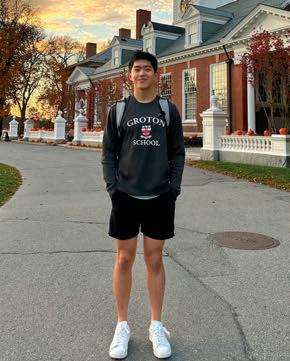
As I watched the Groton flag parade in my Fourth Form fall, my eyes were drawn to the Five-star Red Flag, a symbol of my Chinese heritage. Just a year prior, at the flag parade at the International School of Beijing, I clutched a different emblem: one with thirteen stripes and fifty stars, a representation of my home in the U.S. But as I watched the parade wind its way around the Circle, a perplexing question echoed in my thoughts: “Where am I from?” When I was nine years old, the answer would have been a resolute “Lexington, Massachusetts.” At fourteen, it would have shifted to “Beijing, China.” But now, an uncomfortable hesitation filled my mind.
With a white picket fence and a two-story brick facade, my childhood home in Lexington was the quintessential representation of suburban America. Nestled at the entrance of a cul-de-sac, it was the perfect location for a young boy to grow up. Walking to school under the canopy of red maple trees and accompanied by the chirps of robins, I was enveloped in a timeless New England tranquility that permeated the dewy morning air. Sheltered from the cacophony of the wider world, Lexington was an idyllic sanctuary of natural beauty and calm.
Our tiny pocket in the neighborhood represented a diverse and close-knit community. My best friend from across the street, Mateo, was Ecuadorian, and his mom offered me fresh empanadas when I came to play. Another neighborhood friend, Dawson, was Irish, and his father taught me the Celtic fiddle since we both played violin. Families in our area alternated hosting various gatherings—barbecues, pool parties, and holiday feasts. The dishes, ranging from Albanian byrek to Chinese spring rolls, each brought something unique to our potluck, their cuisines fusing into a single, fragrant aroma:
“My answer to the question, ‘Where are you from?’ began to evolve. Whether I was competing in science contests or participating in orchestra festivals, I found myself instinctively responding, ‘Groton School.’”
Like a microcosm of the nation, our little cul-de-sac represented the diversity of America.
For the first nine years of my life, I grew up in a unique intersection of the past and present. As I strolled along downtown Lexington, I encountered traces of Revolutionary-era America. The Minute Man statue stood proudly in the town center, while quaint local stores like the Crafty Yankee reminded passersby of the town’s historical legacy. Yet in my small cul-de-sac, I also witnessed a modern representation of the country. In my neighborhood’s blend of immigrant cultures, I saw firsthand how the founding principles of democracy, equality, and inclusion had evolved into a multifaceted and diverse country. For most of my childhood, I was from this tranquil blend of historic and modern America.
In the middle of third grade, my parents told me that we were moving to Beijing. Besides the faint memories of two summer vacations in China, I had virtually no idea what life in another country would entail. Despite my stubborn protests, I begrudgingly found myself on a flight across the Pacific on Christmas Eve 2014.
Stepping out of the airport, the stark contrast between the sprawling Beijing metropolis and my former life in Lexington was immediately palpable. Despite seeing a sea of familiar Chinese faces, I felt an inexplicable sense of distance and alienation. Veils of Mandarin characters flashed across airport signs. A discord of car horns blared in the background. Even the air smelled different: An industrial smog replaced the blue skies of my Massachusetts hometown.
Only in China did I realize how American I was. At restaurants, I pointed mutely at dishes on the menu, only to hear waiters bluntly ask my mom, “How old is he? How come he still does not know how to read?” Joining a local swim team, I could only speak in short Mandarin phrases, observing the natural cadence of my teammates’ banter with longing and disorientation. Ironically, in a
land of Chinese cultural and ethnic uniformity where I should have blended in, I instead found myself more isolated and detached.
After six years in Beijing, the city’s frenetic rhythm eventually became my own. The formerly indecipherable Mandarin characters on street signs became familiar landmarks of daily life. Towering skyscrapers and bicycle bells replaced the maple trees and bird songs of my early years in Massachusetts. But unlike my nine-year-old self, who found these changes unsettling, Beijing had become a landscape I navigated with both familiarity and fondness.
Living in Beijing also deepened my sense of ChineseAmerican identity. What once meant dumplings for dinner and Saturday Chinese school evolved into a more nuanced understanding of my heritage. I immersed myself in wuxia novels, a genre of Chinese fiction about martial arts in ancient China, gaining a new appreciation for the shared stories that shaped China’s collective imagination. Celebrating the Lunar New Year became more than just a festive event: As I set off fireworks with my cousins, I experienced a moment of cultural communion, strengthening bonds with my roots and extended family. My life in Beijing felt like a second identity, an urban and deeply Chinese reconsideration of where I was from.
As I neared my high school years, I yearned to return to America, the place I nostalgically remembered as my childhood home and a land teeming with opportunity. But arriving in person in the spring of 2021, I found myself in a country far different from my third-grade memories. Amid COVID-19 and anti-Asian hate, I felt an increased racial tension in the country. It seemed that just as I had changed during my years abroad in China, the United States had evolved into a more tumultuous and polarized nation. On a personal level, arriving midway through Third Form and after years abroad, American culture felt remote and unfamiliar. Years of competitive swimming left me disconnected from sports like lacrosse, football, and hockey, subjects I could no longer contribute to in conversation. After only using WeChat due to the Great Firewall, I felt out of touch with apps formerly banned in Beijing, like Instagram, Snapchat, and TikTok. Paradoxically, while I had always identified as American at the International School of Beijing, back at Groton, I was categorized as an international student from China. I returned to America excited to reconnect with the culture from my childhood, but ironically, felt more Chinese than ever before.
Yet over the next few years, Groton gradually transformed into a place of belonging and identity. As I laughed with friends in the Dining Hall, ran with teammates through Town Forest, and performed with peers in Gammons, the Circle became an additional, third home. From late-night conversations to test cramming, I
Clockwise from right, Eric and his childhood friends from Lexington; competing for Groton’s cross country team; with fellow students outside St. John’s Chapel following his chapel talk.
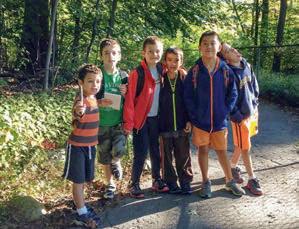
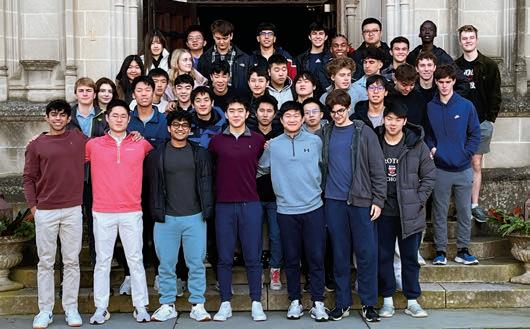

navigated moments of serene happiness and stark anxiety with my friends. Just like my own parents, my advisor and teachers offered me guidance through a myriad of setbacks, whether they were flunked tests or bouts with the winter flu. From the encouragement of sports captains to the warmth of dorm prefects, the leadership of older students subtly shaped my own character. During my threeyear stay at Groton, my answer to the question, “Where are you from?” also began to evolve. Whether I was competing in science contests or participating in orchestra festivals, I found myself instinctively responding, “Groton School.” On these occasions, even though I was the one presenting the research or music, the support and encouragement of the Groton community stood behind me. Despite my initial doubts upon arriving in 2021, Groton nurtured, included, and embraced me back to the U.S.
This fall, as I watched the flag procession pass by, I finally had an answer to my former conundrum. Perhaps all of the geographical and cultural markers of my life form a part of me. I’m a fusion of the tranquil maple canopies of Lexington and the bustling glass skyscrapers of Beijing, nourished by diverse immigrant potlucks and intimate traditional family celebrations. Instead of constraining myself to a single place, culture, or people, I’m from everywhere that has impacted and nurtured me in my life’s journey. The fifty stars of the U.S. cultivated my childhood of peace and diversity, the five stars of China deepened my connection to my cultural heritage, and through Groton School, these backgrounds have been woven together. I’m represented by a flag of fiftyfive stars, and it is the blend of diverse cultural identities behind these stars that I’ll always carry with me.
 by Elizabeth Wolfram ’23 May 28, 2023
by Elizabeth Wolfram ’23 May 28, 2023
FROM A Grief Observed by C. S. Lewis:
Suppose that the earthly lives she and I shared for a few years are in reality only the basis for, or prelude to, or earthly appearance of, two unimaginable, supercosmic, eternal somethings. Those somethings could be pictured as spheres or globes. Where the plane of Nature cuts through them—that is, in earthly life—they appear as two circles (circles are slices of spheres). Two circles that touched. But those two circles, above all the point at which they touched, are the very thing I am mourning for, homesick for, famished for. You tell me, ‘she goes on.’ But my heart and body are crying out, a grief observed come back, come back. Be a circle, touching my circle on the plane of Nature. But I know this is impossible. I know that the thing I want is exactly the thing I can never get.
Every Sunday growing up, my family and I would have pancakes and waffles. My plate of pancakes had a very particular arrangement: I had seven differently sized circles, each representing a member of my family, and each covered in an ample supply of powdered sugar. The biggest was for my dad, next my mom, my brother Alexander, my sister Catherine, my brother Christopher, then my best friend Faye, and me. My family was the most important thing in the world to me, and in my mind, Faye was part of that family.
Faye and I had met in preschool and instantly became best friends. We’d spend hours hanging out and laughing together, always finding some new adventure or project. Building secret languages was one of our favorite pastimes: whether they were monoalphabetic substitutions (shoutout to cryptography) or complicated ways of replacing any word we might need to text with a given emoji, we always found ways to be creative.
When she went to live in Paris for a year, we texted and FaceTimed constantly, and I even got to go visit her while she was there. We toured the city together, making silly videos for our Barbie-inspired movie everywhere we went, and when we realized we both had the same fluffy hot pink polar fleece, we zipped ourselves to the opposite jacket, almost making us fall right into the Seine. We were both figuratively and literally inseparable.
But somehow, over the years, we drifted apart. When I look back at old text messages, it’s clear that neither one of us was at fault—we both kept texting to say hi, to ask how the other person was, to ask to have playdate, but we both kept missing the texts, or simply forgetting to respond.
When I came to Groton, Faye and I had been apart for some time, but it still felt like a loss every time I thought of her, and remembered how close we used to be. At the start of my Third Form year, I had two best friends from my old school (Anya and Mae) and I was afraid
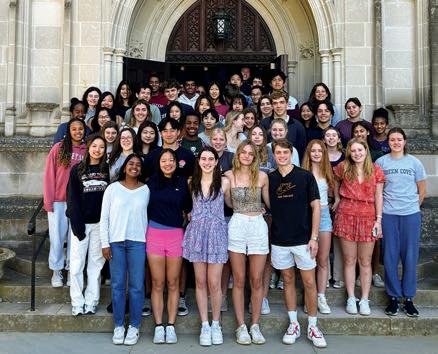

that whatever happened to me and Faye would happen with these friends as well. I even ended up writing a song about this fear, questioning how it was that I came to lose Faye as a friend, and wondering what was stopping me from losing my current friends the same way.
This past summer, I found myself reading A Grief Observed by C. S. Lewis after a friend of mine gave it to me at graduation. In this book, C. S. Lewis thoughtfully describes how he worked through the grief of losing his wife. His writing was so beautiful and so interesting that I found myself finishing the entire book in less than a day. The lines you heard Riya read just a few minutes ago stood out to me in particular. I think that this idea that people’s souls are like spheres, their circles intersecting in the plane of existence is so beautiful, and I find myself thinking about it often these days.
If I understand C.S. Lewis correctly, he is imagining a plane of Nature of existence that rests below the hemispheres of these extraterrestrial spheres. The circles may intersect or they may drift apart but, even when the circles are no longer touching, the rest of the spheres are


still conjoined to one another. Sorry guys, but you know I had to have some math in my chapel talk.
Ever since reading about this idea of circles and spheres, it’s been a constant in the back of my mind. Who’s spheres do I intersect with? What does my sphere, or really any sphere, consist of? Is it your personality? Is it your soul?
While listening to some Taylor Swift on my drive home a few months ago, I found myself thinking about these spheres, and suddenly thinking about their connection to a line from a passage I had to memorize for Dr. Reyes’ Latin 3 class a few years ago. Many of you have also probably memorized William Johnson Cory’s On Education. Though I don’t necessarily agree with everything he says, one line from the passage stood out to me, and popped up again in my mind as I slowed to the red light by the Dunkin I pass everyday. He says that you need not “regret the hours you spent on much that is forgotten, for the shadow of lost knowledge at least protects you from many illusions.”
The shadow of lost knowledge … I thought about the
“What will happen when each of our circles, intersecting on this Circle, are no longer touching? How can we ensure that our spheres will continue to intersect?
knowledge and information I may forget, but which I know will still affect me for the rest of my life. In some ways, this shadow of lost knowledge may really just be like the spheres that C. S. Lewis describes. The knowledge we’ve gained may not intersect with the plain of our conscious thoughts at any given moment, but the sphere of knowledge is still there, still buried in some other dimension.
I may not fully remember the details of de Tocqueville’s comparisons of the British and American court systems, but I remember understanding the idea that having the best possible system is difficult and complicated and interesting. I may not fully remember every line of T. S. Eliot’s The Wasteland, but I remember understanding the idea that poetry and the introspection that comes with it can help us understand human nature.
And I may not fully remember the story of every Barbie-themed movie that Faye and I made, but I remember how when we laughed together, we felt the purest form of happiness, the purest form of joy.
Now, I don’t know if I believe in fate, or hidden metaphors in our crazy lives, but it’s crazy to me that two days after this car ride, when I randomly happening to be thinking about the spheres, and shadows, and Faye, I ended up running into Faye at a coffee shop. We immediately started talking and catching up, lamenting the fact that we hadn’t seen each other in such a long time. We’re all familiar with the wonderful phenomenon of meeting up with someone after a long time and feeling like no time has passed. But this was not the case for us—we both had changed a great deal from the little blonde and brunette girls who sang in the rain. Our circles no longer intersect.
But as we sat and talked, though I was saddened to see that we had drifted so much, I realized that there are many ways in which our spheres are still intersecting. She still loves singing, as do I, and is even going to college for singing and acting, something she told me she wanted to do when we were just seven years old. I also learned that next year I’ll be going to the same school as her sister, the same sister who used to help us film slow motion videos of us whipping our hair back and forth before jumping into
rainbow striped beanbags. Our spheres still intersect.
Now, just nine short days away from Prize Day, these spheres are all I can think about. What will happen when each of our circles, intersecting on this Circle, are no longer touching? How can we ensure that our spheres will continue to intersect?
Walking along the familiar route of the AC to the Dining Hall, I found myself with yet another quotation popping up and rattling around in my head: “Do not go gentle into that good night. Rage, rage, against the dying of light.” Maybe, just maybe, it’s possible to rage against the dying of a friendship.
As it turns out, Anya and Mae, those two best friends I mentioned earlier, are still two of my closest friends. And I don’t think it is completely random that they are. We each fought against the dying of the light, and did not go gently into a good night of drifting apart. With their conversations pinned in my Messages app, I see the circles of their faces everyday, reminding me to check in with them and see how they’re doing, maybe even FaceTiming them if we have time.
I think about how this poem might relate to us as we leave this circle, and how we hang on to the people who matter to us. And I again think about that shadow of knowledge. How can we hold on to all the knowledge that we’ve gained in these last four years, when we find ourselves thrown into an entirely new environment? Perhaps this rage, this unflagging fight for life, is the key.
There’s one caveat of this idea, though, and it’s one which Dylan Thomas admits in the poem: that mortality is real. No matter how much we fight to stay alive, eventually we must die.
But what C. S. Lewis reminds us is that even when a person, a piece of knowledge, or a friendship dies, our spheres still intersect—we are always still connected to that which seems to be gone. What’s gone, he says, is really just in another dimension.
I hope that I can follow through on raging against the dying of the light, on fighting for the friendships and people that matter to me most, on fighting to keep the knowledge and memories and experiences that I’ve had here at the forefront of my mind, keep them all as circles intersecting in the plane of my conscious life. But I also know that I can have peace of mind knowing that, no matter what, the spheres that have blossomed for me, for my friends, and for all the people I have come to know at Groton, will always be connected.
So really I just want to say thank you to all the spheres I’ve come to intersect with here at Groton. All the people, all the ideas and bits and shadows of knowledge, and all the moments that have made these last four years mean so much to me.
I wish I could put you all onto my plate of pancakes, but I don’t think you’d all fit. So the best I can do is simply say “thank you.”

Andy Anderson P’15, ’17, ’20
The Greatest Rowing Stories Ever Told
Assistant Head of School and longtime Groton crew coach Andy Anderson, who writes the popular “Doctor Rowing” column for Rowing magazine, is featured in The Greatest Rowing Stories Ever Told, edited by Göran R. Buckhorn.
The Greatest Rowing Stories Ever Told collects articles and excerpts of classic rowing stories, from the inception of the sport on English waters in the eighteenth century, through the scandalous era of professionalism (and gambling) of the nineteenth century, to the popular amateur sport of today. The contributors include prominent oarsmen and women, historians of the sport, and even poets and songwriters.
Anderson’s contribution, “The Legend of the Japanese Eight,” was first published over two issues of American Rowing magazine in 1994 and 1995. The combined articles were also later published in Anderson’s own The Complete Dr. Rowing collection.
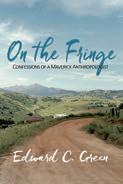
Edward Green ’63
On the Fringe: Confessions of a Maverick Anthropologist
Medical anthropologist, former Harvard AIDS Prevention Project director, and former member of the Presidential Advisory Council on HIV/AIDS bares his personal and professional adventures as a rebel researcher and intrepid traveler in his stunning memoir.
Green takes the reader on an intimate and thrilling journey through diverse corners of the globe, giving on-the-ground insight into the world’s most fascinating cultures, such as “spirit mediums” in Nigeria, sex workers in Tanzania, Shaolin masters in China, and Samaritans in Palestine.
W ith vulnerability and candor, Green also reflects on his notable career as an anthropologist: how he helped transform public health initiatives while battling periodic anxiety, depression, and deepseated Impostor Syndrome. His memoir is a deeply moving, expansive account of his adventurous life as a self-proclaimed rebellious anthropologist and his uncommonly fearless approach will encourage others to dig more deeply and honestly into what it means to live an authentic, boundless life.
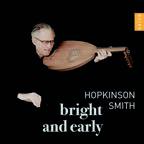
Hopkinson Smith ’65
Bright and Early: Italian Lute Music from the
The lute books of Francesco Spinacino (1507) and Zoan Ambrosio Dalza (1508) are milestones in the history of music. From the press of Petrucci in Venice, they contain not only the first lute music to be printed, but, apart from some tablature fragments, also the very first sources of music for the instrument that have come down to us. Both give testament to a true flourishing of lute culture in Italy at the dawn of the sixteenth century.
But Spinacino’s tablatures are full of mistakes. The challenge for the interpreter here is first of all to reconstruct a coherent text where the lacunae are filled out and disparate ideas are clarified and reconnected.
The music of Zoan Ambrosio Dalza is the perfect complement. His energy, invention, and virtuoso flourishes are always present and aficionados of country music will find some passage-work here that has an occasional hint of bluegrass.
The program is played on a six-course lute with octave stringing on the third through sixth courses. This solution, with its ringing clarity and brighter resonance, comes out of a late fifteenth century tradition and is implied by the music itself.
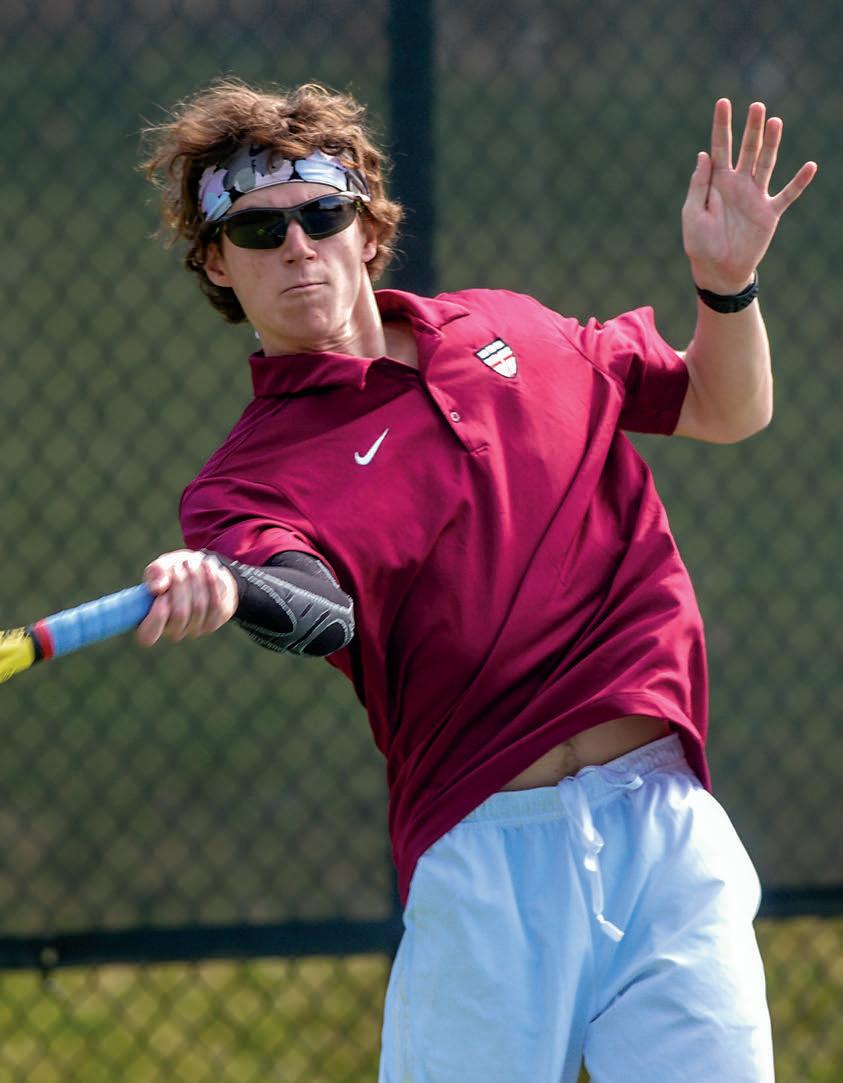
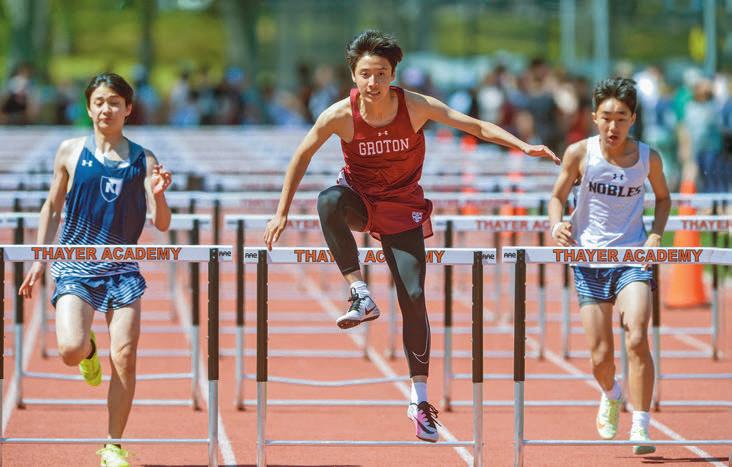
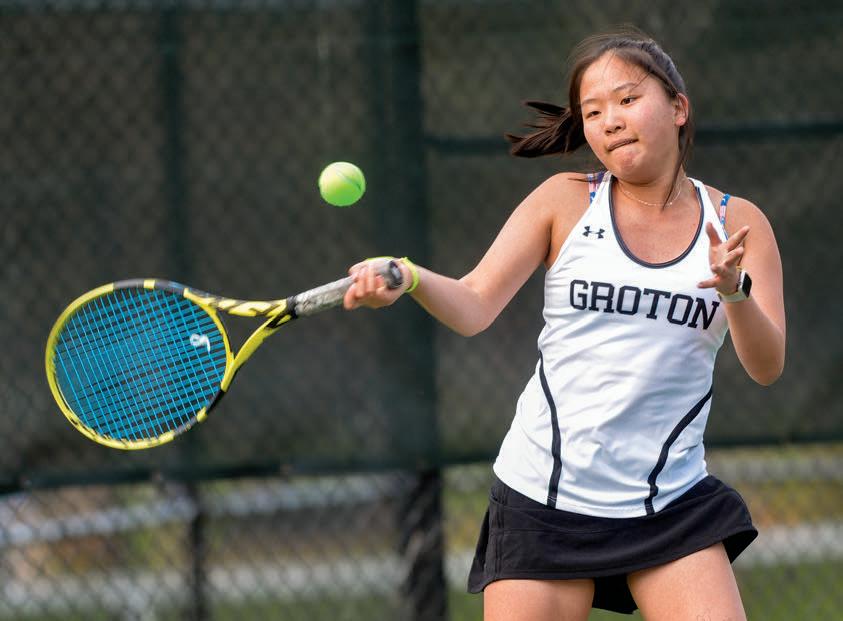
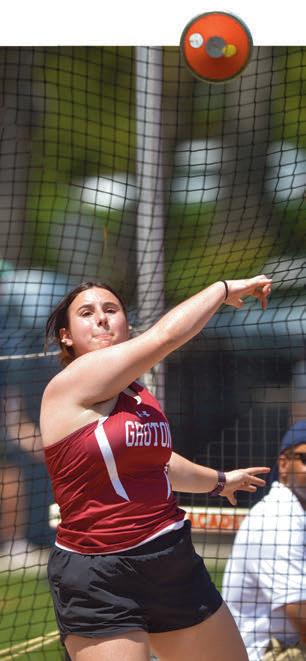
With brilliant leadership from Captains Larry Li, Jack Lionette, and Will Vrattos, the boys tennis team completed a remarkable season, which included a 16 –1 record with victories against Andover, Exeter, and Deerfield. The team won the Kingswood/Oxford tournament as the spring began, besting strong teams from Choate, Deerfield, Hotchkiss, Lawrenceville, Westminster, Kingswood Oxford, and Hall. Groton subsequently won all dual matches of the season, save one. The team earned the No. 1 seed at the New England Class A Championships, where they beat Loomis Chaffee in the quarterfinals, Andover in the semifinals, and then lost a thrilling match against Hopkins in the finals.

This group was truly a team. Everyone played a key role. In his very opening match representing Groton, varsity newcomer Michael Lu defeated a strong Exeter player to help secure Groton’s first victory of the season, 4 –3. Both Griffin Gura and Trip Wight had huge wins throughout the spring at crucial moments for the Zebras.
Sixth Formers Alec Konigsberg and Lucas Li were always willing to do whatever it took to help the team, and managers Colby Gund and Alicia Guo were at-the-ready with good cheer and flawless logistics for all matches.
Yet this season especially belonged to the amazing Sixth Form captains, who lost an entire season to COVID during their Third Form year. As Fourth Formers, there
were only seven matches. Yet, during their three years of competition, they led the team to an astounding record of 41–1 in dual matches. One ISL League Championship. A combined 7– 0 record against Andover, Exeter, and Deerfield. Twice ranked #1 in New England Class “A.” Two of these captains won the top athletic awards at Prize Day. Larry Li, in fact, was among the very best tennis players/sports ever to represent Groton School. It truly was a season for the ages.
Captains-elect Griffin Gura, Michael Lu, and Trip Wight are eager to continue this team’s very special legacy. Coach John Conner
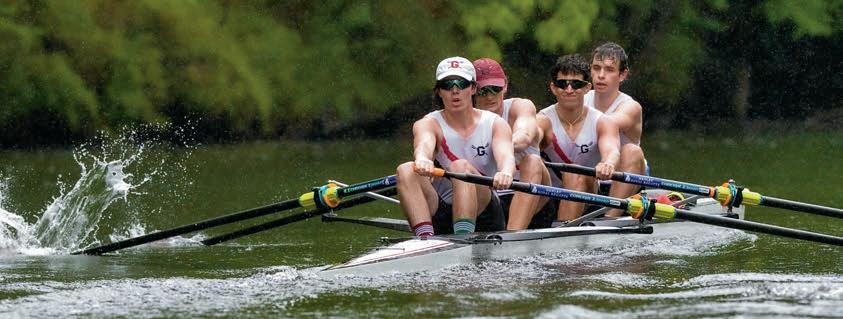

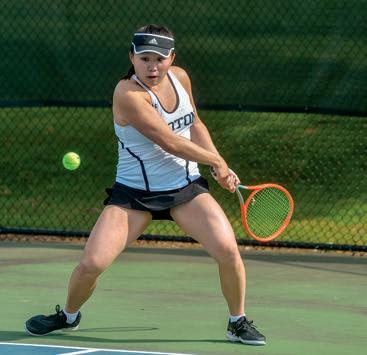
It was another banner year for Groton girls’ tennis. The team successfully defended its ISL crown and posted one of the best records in program history.
After a loss in the opening match of the year, the girls reeled off 15 straight wins to finish the season and earn the #2 seed in the Class A New England Championship. The Lady Zeebs would eventually fall to the Hoosac School in an incredibly tight semifinal match.
The Form of 2023 graduates have never lost the ISL title. Their energy and leadership have put the team on the path to greatness. The entire Groton tennis program continues to be a model of success on the Circle, and things look even brighter in years to come.
Coach R yan HolmesAlthough the boys varsity crew didn’t win any trophies at the NEIRA, they had a strong year. Over the last calendar year, there have been things to celebrate. Six of the boys rowed at Henley in England last summer, the trip having been a consolation for the two springs that were missed because of the pandemic. The first two boats comprised those six plus two experienced Fourth Formers and had some good races on their way to a 6–3 record. The third and fourth boats welcomed a bunch of new oarsmen into the fold, many of them Lower Schoolers; their strength and athleticism will power Groton boats for the next few years.
Our dual racing resulted with wins over BBN, Middlesex, Taft, and Pomfret. Belmont
Hill, Nobles, and Brooks beat us in close races. A highlight of the season was the Cooke Family Cup held on the Nashua River on Reunion Weekend against St. Mark’s. The Cooke Cup is awarded to the school that wins the majority of the eight varsity boys and girls races. Despite torrential rains, the racing was good: the boys swept our rivals, the girls won three of four. We also celebrated by christening a new boys shell, the Form of 1972, donated by an anonymous member of the form to recognize his form mates. At the NEIRA regatta, all boats progressed through their heats and made the finals. The third boat won a bronze medal. Overall, the boys placed fourth out of the twenty-two schools competing in the team trophy.
Coach Andy Anderson
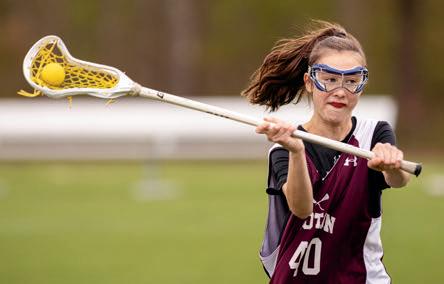
Sitting here, writing a recap for the Quarterly on the cusp of June, rowing preseason seems like both yesterday and a thousand years ago. Coming down to the boat house everyday gives us a better view than most to the unfurling of spring here at Groton. The patchy snow piles we saw at preseason could barely conceal the dreary gray and brown landscape of the boat house road. We bundled up against the cold rain, or worse, a spring snow squall, in the early days of April. Finally in mid-April wait, are those buds on the trees? we had our first race against Lincoln School, where all boats won.
On this beautiful spring day, we had a lovely naming ceremony for our new boat, the Betsy Wray Lawrence / Women of ’82,

with the women of ’82 present and Betsy, herself, pouring water taken from the finish lines of the Nashua, Lake Quinsigamond, and the Thames at Henley over the bow. Winning her first race surely portends many wins in her future! The women of ’82 urged the young women of ’23, ’24, ’25, and ’26 to dream big and pay it forward.
And so we got into the rhythm of our racing season. Gluckers on Monday! Tetis on Tuesday! Three parts of the race on Friday! De-rig and load up the trucks! Unload and rig! Race! Win! And more de-rigging and loading and unloading and rigging before we start all over with Gluckers again on Monday. Sounds like a blast? Right? Actually it is.
We raced Pomfret and Taft at the end of April on Lake Quassett, where all eight
boats girls and boys beat Pomfret and Taft in a sweep that earned us a shout out as Teams of the Week.
During the deluge of Reunion Weekend we contested the Cooke Cup against our arch nemesis, St. Mark’s. For the first time ever girls and boys raced St. Mark’s at home together and we easily won the Cooke Cup 7–1.
We like to beat St. Mark’s a week early, so on the last Saturday in May while the rest of the spring teams played them we were at our big championship regatta at Lake Quinsigamond. We had lots of great racing. The first three girls boats made the grand finals, the second boat won silver medals, and the fourth boat beat a boat in their heat that they had lost to two weeks prior.

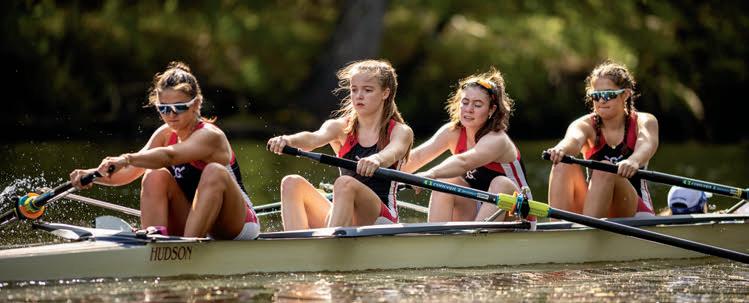
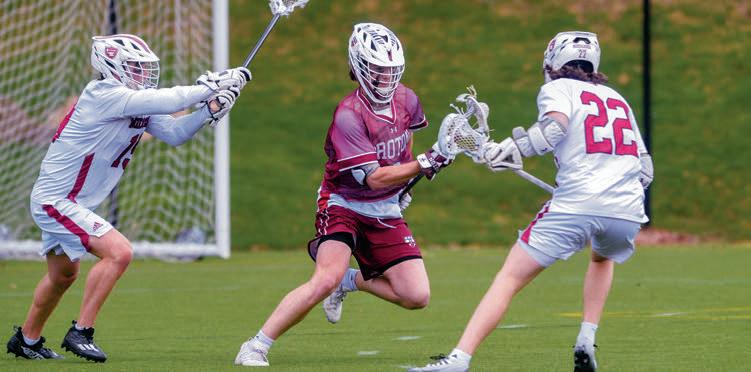
In the week leading up to the St. Mark’s Monsoon, spring had finally arrived on the Nashua with an explosion of green. And in the week leading up to NEIRAs, it was a week of lasts. Last Gluckers, last trip to the third bridge, last blue heron sighting, .ast practice on the Nash. We will miss our seniors Amelia, Olivia, Maya, Chloe, and Alice and we wish you all best in college and beyond. And at the same time, we look forward to more fast boats next year on the Mighty Nashua.
Coach Cola Parker
What could be more gratifying than when in over half of the post-game handshake
lines league coaches would echo the refrain: “Your kids play hard, are tough on the ground, and never give up”? Captains Brayden Haggerty and Luke Romano—as well as fellow VIth Form leaders Tyler Bowden, Hugh Carlin, Lucas Gordon, Theo Koukopoulos, Jack Travis, and Joon hang— carried on the leadership tradition that defines our team culture: work ethic, team spirit, toughness, sportsmanship, and inclusivity. In particular, this group exhibited the toughness—the perseverance—that enabled us to battle game in and game out, week in and week out, with several players sidelined due to illness and injury.
Haggerty, Romano, and fellow seniors set the tone at our annual spring training trip in Naples, Florida, where we forged our
identity through several sessions under the hot sun. Playing Florida HS State Champion and perennial powerhouse St. Andrew’s provided an immediate measuring stick, and throughout the spring we soldiered on to our ISL Tournament Consolation Final (9–7 loss to Roxbury Latin), culminating our season with a victory over rival St. Mark’s. Beating Rivers, RL (earlier in season), St. Paul’s, and Middlesex were certainly highlights, but competing hard against highly ranked Governor’s (6–4) and Tabor (8–7 OT) also displayed our grit and moxie.
As much as we are grateful for the team culture our Sixth Formers have helped to perpetuate, we are confident that our rising Sixth Formers and underformers have learned the ropes and will build on the
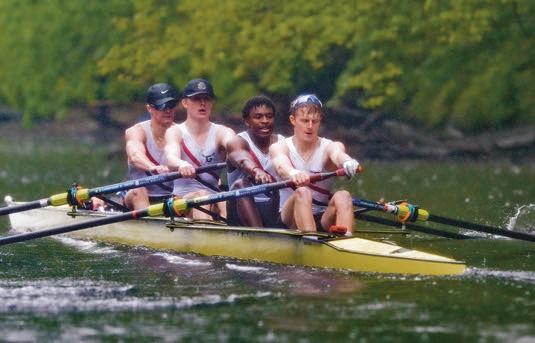
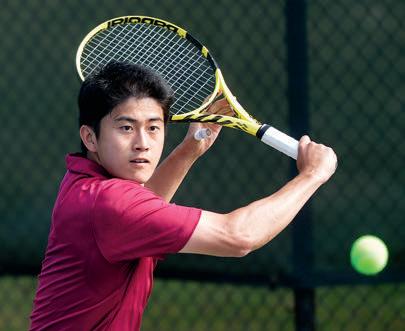
bedrock set forth by previous predecessors. With eager junior varsity athletes as well as some newcomers, Groton’s lacrosse future continues to look promising. Many thanks to coaches Greg Hefler, Mark Bolduc, Jamie Funnell, and Peter Fry, as well as to our parents, alumni, and supporters. We were fortunate to have you on our sidelines throughout our journey. Thank you to our two dedicated managers, Tyler Santana and Kritika Aryal.
Coach Bob Low
The 2023 season was very successful for the girls lacrosse team. The girls finished with a 12–5 overall record with highlight wins over

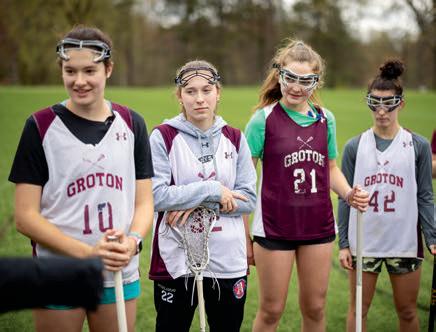
Tabor and St. Mark’s. The girls also advanced to the semifinals of the ISL Lacrosse tournament, losing to Nobles. Starting with their spring trip to Florida in March, the girls gelled together very quickly. The team learned that if they just competed harder than their opponents every game, they could be very successful. They also made it a team goal to stay positive with each other and to keep team morale high. Though the program will miss their departing seniors, the core of the team is returning, and the coaching staff is excited for the upcoming spring.
Coach Julia Rowland
The baseball team welcome new head coach
Kevin Barnaby this past spring, who quickly put the team to work with a productive, and only slightly chilly, spring training at a nearby turf field complex in Northborough. While we graduated two All-ISL players from the 2022 team, a strong core of veteran leaders remained, led by co-captains Ziggy Bereday and Dylan Vigue.
Spring training, as well as a pair of competitive scrimmages, had us well prepared for our first game against St. Paul’s, and Dylan blasted a homer on the second pitch of the season to get us off on the right foot en route to a 9–4 win. A few days later we faced off against the 2022 league champions in Lawrence Academy and battled our way to an 8–7 victory.
A challenging stretch followed, where we
MVP Ziggy Bereday ’23
Cy Young
Dylan Vigue ’23
Silver Slugger
Forrest Nelson ’24
ISL Golden Glove
Gavin Cronin ’24
ISL All League
Dylan Vigue ’23
All NEPSAC
Honorable Mention
Ziggy Bereday ’23
ISL Honorable Mention
Ziggy Bereday ’23
Forrest Nelson ’24
2024 Captains-Elect
Ben Milner ’24
Forrest Nelson ’24
Zach Webber ’24
2024 Captains-Elect
CJ Armaly ’24
Ryder Cavanaugh ’24
2024 Captains-Elect
Isabella Gardiner ’24
Kit Knuppel ’24
Agathe Robert ’24
Fred Beams
Coaches’ Award
Lucas Gordon ’23
MVPs
Brayden Haggerty ’23
Luke Romano ’23
Most Improved
Zach Baker ’25
ISL All League
JP Charpentier ’25
Luke Romano ’23
ISL Honorable Mention
Brayden Haggerty ’23
Patty Keegan ’24
Amos Lawrence ’24
Chris Munroe ’24
All NEPSAC
Brayden Haggerty ’23
Luke Romano ’23
All NEPSAC Honorable
Mention
Angus Frew ’25
Jack Travis ’23
were unable to come up with the key plays we needed on both sides of the ball, as we dropped 9 of our next 11 games, many of them tight games. Though it was a disappointing set of results, it was clear that the players were growing more comfortable with new systems and strategies, and were picking up on nuances of the game to gain an extra edge. A tough 12–9 loss to BB&N saw the team steal an impressive 8 bases without getting caught.
Sure enough, the final five games of the season included three wins by at least ten runs, including shutouts of St. George’s (a combined effort by Dylan and Kiran Sen) and Rivers (Dylan and Zack Webber). Against St. Mark’s, Dylan once again led off the game with a homer, and after briefly falling behind 2–1, the offense exploded for six runs in the third and five more in the sixth for a 12–2 final to back Dylan in his final Groton game. The team showed off an impressive mix of power and speed this season, mashing 10 home runs (Dylan 5, Forrest Nelson 4, and Ziggy 1) while stealing 56 bases (led by Ziggy with 13), including a perfect 39 for 39 in our last 10 games.
Dylan received All-ISL honors while leading the league in home runs as a hitter and
2024 Captains-Elect
Patty Keegan ’24
Amos Lawrence ’24
Chris Munroe ’24
Coaches’ Award
Genevieve Nelson ’25
MVP
Giulia Colarusso ’24
ISL MVP
Giulia Colarusso ’24
ISL All League
Giulia Colarusso ’24
Maddie Cronan ’25
Allie Kandel ’23
ISL Honorable Mention
Eliza Brooks ’26
Genevieve Nelson ’25
ALL NEPSAC
Giulia Colarusso ’24
Maddie Cronan ’25
ALL NEPSAC
Honorable Mention
Eliza Brooks ’26
Allie Kandel ’23
2024 Captains-Elect
Giulia Colarusso ’24
Ellie Smith ’24
ISL All League
Griffin Gura ’24
Larry Li ’23
Trip Wight ’25
ISL Honorable Mention
Jack Lionette ’23
Will Vrattos ’23
All NEPSAC
Griffin Gura ’24
Larry Li ’23
All NEPSAC
Honorable Mention
Jack Lionette ’23
Will Vrattos ’23
2024 Captains-Elect
Griffin Gura ’24
Michael Lu ’24
Trip Wight ’25
ISL MVP
Lindy Zhang ’25
ISL All League
Ella Farahnakian ’25
April Li ’24
Julie Xie ’23
Caiyu Yang ’25
Lindy Zhang ’25
Aimee Zheng ’23
strikeouts as a pitcher, while Ziggy and Forrest were honorable mention for All-ISL and Gavin Cronin earned an ISL Gold Glove award for his stellar defensive play in the outfield. We will miss the leadership of seniors Dylan, Ziggy, Kiefer Wood, Mike Pelletier, and Paulo Ley Duarte but look forward to a great 2024 season with new captains Ben Milner, Forrest Nelson, and Zack Webber.
Assistant Coach Preston Bannard
The Groton track and field program made tremendous progress again this past year. The team continues growing, with more than fifty members on the combined boys and girls team. Furthermore, both teams are making noise around the ISL. For the first time, the girls team won multiple track meets. Due to its increased size, they could compete in all seventeen track and field events.
The boys also won the second-place trophy at the NEPSTA Division III Championship meet, consisting of twenty-four private schools. Groton’s Salim Hill won the 100meter dash, took second place in the 200 meters, and was the anchor of the 4x100meter relay, earning him MVP of the meet.
All NEPSAC
Lindy Zhang ’25
All NEPSAC Honorable Mention
Ella Farahnakian ’25
Caiyu Yang ’25
2024 Captains-Elect
Amelia Barnum ’24
April Li ’24
Boys’ Awards
Coaches’ Award
Jaden Adinkrah ’23
Osric King ’23
MVP
Salim Hill ’25
Most Improved Award
Ayush Pillai ’23
ISL All League
Quinn Clubb ’23
Salim Hill ’25
All NEPSAC
Kogo Bennsion ’24
Quinn Clubb ’23
Jeremy Gall ’24
Salim Hill ’25
Christopher Hovet ’25
Will Klick ’25
Aidan O’Connell ’23
4 x 100: Jaden Adinkrah ’23, Nasir Hill ’26, Salim Hill ’25, Sam Winkler ’23
4 x 400: Jeremy Gall ’24, Will Klick ’25, Aidan O’Connell ’23, Ayush Pillai ’23
2024 Captains-Elect
Jeremy Gall ’24
Andres Palacios ’24
Girls’ Awards
Coaches’ Award
Josia Sulmasy ’23
MVP
Alicia Ye ’25
Most Improved
Kristen Billings ’25
All NEPSAC
Kristen Billings ’25
Tyler Martens ’27
Alicia Ye ’25
4 x 100: Daisy Adinkrah ’24, Kristen Billings ’25, Tori Reece ’25, Alicia Ye ’25
4 x 400: Inga Bartsch ’24, Grace
Best ’26, Amy Ma ’23, Tyler Martens ’27
All NEPSAC
Honorable Mention
Jenny Polynice ’25
2024 Captains-Elect
Daisy Adinkrah ’24
Inga Bartsch ’24
As the track coaches and athletes returned to campus this fall, the buzz around campus was, “Have you seen the new track?” For the first time in Groton School history, we will host track meets on our campus this coming spring. The entire ISL is very excited for Groton, because adding another venue to our league cuts down the length of the meets and travel time.
For the past twenty years, Groton School has had to find a local track that we could borrow to practice daily, adding anywhere from thirty to forty-five minutes daily in travel time. Now the time can be used as practice time. This spring, we will be able to walk out the front door of the Athletic Center and step on our new track. We will no longer be known as “road worriers.”
All the coaches and athletes are very excited to start our next season on our new track!
CoachJamie Lamoreaux
On December 10, 2019, King Carl XVI Gustav of Sweden placed a gold medal around the neck of John Goodenough ’40, signifying one of the great honors in science. The next day, more than 3,700 miles away at Roll Call in the Sackett Forum, loud cheers of joy rang out among the Groton student body as they learned that one of their own had been awarded the Nobel Prize in Chemistry for his work in developing the rechargeable lithium-ion battery.
The happiness and pride felt across campus that day was replaced this past summer by sadness upon learning the news that Dr. Goodenough had passed away on June 25, one month shy of his 101st birthday. Already the oldest recipient of the Nobel Prize, he continued working in his office at the University of Texas at Austin up until the last few weeks of his life.
As an organometallic chemist myself, I followed Dr. Goodenough’s career with great interest. He was born in Germany and grew up in Connecticut, where his father was a professor at Yale. He came to Groton in 1934 but dyslexia made academics a challenge. Nevertheless, he worked tirelessly at his studies—embracing poetry as a way to better understand the written word—and graduated at the top of the Form of 1940. He entered Yale and graduated in 1944 before joining the U.S. Army during World War II. Upon his return, he earned a PhD in physics from the University of Chicago.
He moved to Oxford in 1976 and became a professor and head of the Inorganic Chemistry Laboratory at St. Catherine’s College, where he started his pursuit of what would become the lithium-ion battery.
It was around this time that climate change and energy independence began to have a concrete impact on everyday Americans, as the Organization of Petroleum Exporting Countries’ oil embargo caused massive fuel shortages and gas rationing in America. As a result, the challenge of energy conservation moved to the forefront of Dr. Goodenough’s work, since—as he told the Quarterly in 2019, shortly before receiving his Nobel Prize—he didn’t believe the dependance of modern society on fossil fuels was sustainable. “With the energy crisis in about 1976,” he said then, “the Western world suddenly became alerted to its vulnerability, to its dependence on imported oil.”
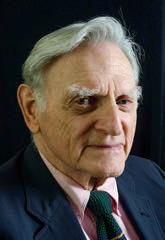
Electric vehicles were still in their infancy at that time, partly because their power sources limited range and speed, all while requiring frequent recharging. The lithium-ion battery he pioneered allowed for a fast-charging battery with higher capacity that helped transform the electric-car industry, lowering costs and making electric vehicles more efficient and practical.
Dr. Goodenough began his career at the Massachusetts Institute of Technology’s Lincoln Laboratory in 1952 and over twenty-four years there helped develop random-access memory (RAM) for the digital computer.
Dr. Goodenough credited Groton and founding headmaster Endicott Peabody for transforming him, both as a learner and spiritually, and he embraced the school’s mission of service throughout his life. He received no compensation from Sony when it licensed the first marketed lithium-ion battery, and the University of Texas
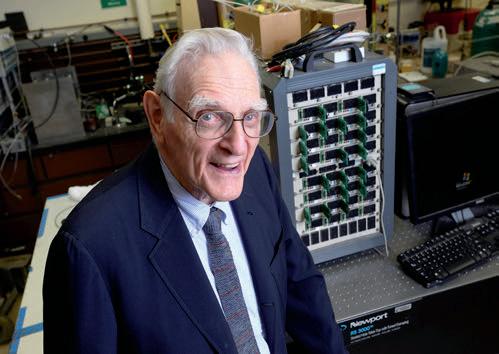

holds all of the patents he developed during his thirtyseven years working there. Neither fact ever caused resentment or bitterness.
“You have to choose what to serve and whom you serve,” Dr. Goodenough told the Quarterly in 2019. “It’s not in service, it’s in His service. What you serve determines what you become.”
Dr. Goodenough’s legacy of service provided further inspiration as Groton began to examine its role among independent schools as a leader in sustainability, and the solar battery farm that reduced campus reliance on fossil fuels—a first among independent schools—is named after him.
Understandably, Dr. Goodenough’s long and brilliant career included its share of recognition. In addition to the Nobel Prize, Dr. Goodenough was awarded the Royal Society’s Copley Medal, the 2013 National Medal of Science, the 2014 Charles Stark Draper Prize for Engineering, and the 2017 Robert A. Welch Award in Chemistry. He also wrote several books, including his
2008 autobiography, Witness to Grace Dr. Goodenough’s work and connection to Groton have been an invaluable teaching opportunity for my Environmental and Organic Chemistry classes, and my students are always fascinated that someone who sat where they sat became a leading light in the field. In 2020, when he joined his brother Ward (the late anthropologist and University of Pennsylvania professor who was a member of the Form of 1937) as a recipient of the Distinguished Grotonian award, I told him, “You represent all that we hope for in a Groton graduate.” That sentiment will never change.
My greatest regret was my inability to join him at his 100th birthday when he invited me and other scientists to celebrate a century’s worth of achievements. A day before I was scheduled to board my flight, I caught COVID and simply sent my regrets since I could not join this illustrious son of Groton.
May he rest in eternal peace, and may his memory forever be a blessing and inspiration to all Grotonians.
February 22, 1936 –June 19, 2023
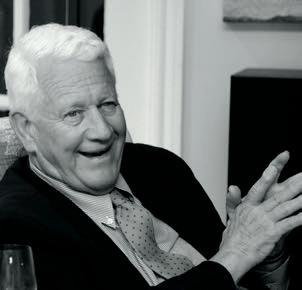
BEFITTING A TRUE Mainer, Charlie Alexander dodged compliments by deflecting them to others. But on a beautiful Sunday afternoon in early August, there was no deflecting of compliments by family and friends that were shared from the Chapel pulpit and filled the conversations at the reception after the memorial service. The greatest compliments that day were unspoken: the number and range of former students who traveled from near and far to honor a person who left a telling mark on their lives: members of his mid-eighties Third Form Latin class; people he coached in football who often heard him yell, “Learn your plays”; those to whom he hit fungoes on the baseball field; others who benefited from his college counseling; and those who experienced his care as they encountered him around the Circle.
Arriving at Groton in 1960, Charlie filled lots of roles
during his tenure: teacher, coach, dorm head, director of studies, college counselor, head of the Discipline Committee, member of the committee that recommended that the school go coed. Along with Ann, he was a strong mover in Groton’s transition to a coed school, and certainly he was an important advisor to headmasters.
Charlie was a strong advocate for the Chapel in the life of the school. To ensure a certain deportment was maintained at daily Chapel, he sat in the back where his presence was not lost on those who preferred the back rather than the front.
Charlie had a prodigious memory of every Groton sporting event and of key games in the history of the ISL. He could tell you who blocked a punt in the second quarter of a football game played many years ago. He could also tell you something about the father of the player who blocked the punt! That Charlie could make the connection with so many people was a reflection that at his core stood an immovable belief in the sanctity of relationships. So many of us in Charlie’s world benefited from that belief.
Often sternly demanding, Charlie did not believe in the easy way out or a half-hearted effort. What he believed was that students developed self-confidence and discovered their abilities by responding to challenging standards of academic excellence and personal behavior. Charlie set a high standard for faculty as well as for students. Many responded to Charlie’s exhortation, “You can do better than this and you can be better than this!” Such beliefs fueled the culture of the school.
An accolade Charlie often used when describing someone was, “a very fine person.” It is fitting as we bid farewell to this special friend that we return the compliment: Charlie was “a very fine person!”
—Bill Polk Headmaster, 1978–2003WHEN I BEGAN writing this remembrance, I set out to construct a comparison between my grandfather and the centaur Chiron, teacher of Achilles and Hercules. I thought it would be fitting to remember Poppy through the lens of Classics, but after a few hours of scouring an English translation of the Achilleid, I realized that my own limited knowledge of Classics represented an issue. I could practically hear Poppy chiding me for making the whole thing more complicated than it needed to be, and so instead I decided to start with this simple fact:
My grandfather was a teacher.
Teaching was more than just an occupation for Poppy—it was a state of being. He always had the ability to turn his surroundings into a classroom, and never shied away from doing so. I know that I speak for all of his grandchildren, and many others when I say that it was truly a privilege to have access to this fount of knowledge on so many subjects, but most prolifically seashells, the Red Sox, and the results and details of seemingly every single Groton athletic event contested during the past seventy years.
So yes, sometimes learning from Poppy meant sitting through a verbal treatise on the Spondylus americanus— that’s Latin for Atlantic thorny oyster shell—or a playby-play of the 1979 St. Mark’s game, but much of what Poppy taught me was through the example he set:
• Most importantly, he showed all of us how to be a loving partner in his relationship with my grandmother
• When I saw Poppy on breaks from college, our conversations followed a familiar cadence. He’d first ask me how my studies were going and then tell me I should be spending more time in the library. Sometime after that, he’d start up a conversation about UVA’s football or basketball teams. He often knew more than I did, and it was always apparent that he’d done his research and had been waiting to talk to me about it. While perhaps not overly expressive in his feelings, Poppy had other ways of showing that he cared.
I’ll always remember the way Poppy treated every person with whom he interacted with the same measure of respect. His kind-heartedness and generosity were apparent to anyone he met, and he was so skilled in the art of connecting with other people. He took the time to ask simple yet probing questions and held conversations to a certain standard, often challenging others to rise to his level. He had a unique way of thoughtfully crafting a conversation, putting others at ease while skipping over useless small talk.
Through this combination of respect, thoughtfulness, and high standards, Poppy treated generations of teenagers here at Groton like the adults he would help them to become.
It is only fitting that Poppy will continue to teach me, as I learn from the fine example he set and hope to continue his legacy of love, kindness, generosity, and respect.
John MacEachern ’16 (grandson)WHEN I THINK of Poppy, there are many words that come to mind. Hilarious, brilliant, crabby, and passionate, to name a few. I am going to touch on a few of those.
I will start with hilarious. As many of you all know, Poppy was obsessed with shells. That was often a topic of conversation of ours and ninety-nine percent of the time I was making fun of his interest in those boring objects. A few years ago I noticed I was getting a lot of emails from the National Shell Museum in Florida. It turns out Poppy had enrolled me as a member of the National Shell Museum and signed me up for weekly email updates.
This next adjective is a big one: brilliant. I mean I’ve never met someone who is practically fluent in Latin. (Is that even possible?) And now back to the shells … no matter how much I made fun of him, I cannot lie, his knowledge on shells was expansive. I would point to any random shell, and he would tell me the shell’s entire name (in Latin and English, of course).
Poppy was a walking encyclopedia. His knowledge of grammar and vocabulary was second to none, and he made sure to—gently—correct everyone around him. I am willing to bet there are many here that have been corrected by Poppy for using “me” instead of “I” or “her” instead of “she.” I could go on about his brilliance but I think we all know that he was pretty special.
Finally, the most important adjective: passionate. Whether it be his clocks, his shells, his golf cart, his Red Sox, his grandkids, his own kids, or his Nini … he was passionate about everything in his life that was important to him. Poppy had his own unique way of showing each person in his life how much he cared about him or her, and to have Poppy love and care about you was a very special thing. For me, it was his constant emails checking in on me, the long talks at the dinner table, and the countless hours of foot massages he gave me.
Poppy was an amazing grandfather and person. I am going to miss the constant reminders to go to the library and study. Poppy, I feel so lucky to have been your granddaughter and I hope one day I am half the grandparent you were to all of us. You are the biggest inspiration and will forever be one of my favorite people.
—Meg Alexander (granddaughter)WHEN I THINK of my grandfather, Charlie Alexander, whom I have known for my entire life as Poppy, I think of the long, hot Nonquitt summer days of my childhood.
I think of Red Sox games, of shell decoration, and of the great number of anecdotes which left eight-year-old me with the conclusion that my grandfather knew just about everybody in living memory. In a single dinner, it was likely that I’d get one story about my father as a student at age fourteen, a story which my father might’ve preferred going untold, one about Ted Williams, and one passage of Catullus.
I remember a particular summer, which I—at around nine or ten years old—spent exploring Poppy’s collections. I recall opening up an old photo album of his from when he was my age, maybe a couple of years older, in which he had diligently recorded, with notes and photographs, his thoughts on the state of the Boston Braves. It was seemingly comprehensive and impossible, at least for somebody at my age. It was this attention to detail, this kind of thought and discipline, that my grandfather applied to everything. It was through careful, season-long attention and his trained eye that he was able to comment on every Red Sox game that we shared together. It was through dozens of books and hours of research that he came to acquire his nearly, to me at least, encyclopedic knowledge of shells, of Latin, and of any and everything else that he set his mind to. And it was with this same level of care and thought that he would tend to his family, and to his students. My grandfather has acted not only as a comforting or supporting presence in my life, but as a greatly positive influence in showing the value of being passionate about everything you love.
—Charlie Sears (grandson)
WHEN I FIRST met Charlie in 1984, I was 21 years old and knew nothing about independent schools, let alone boarding schools. I thought that he was a throwback to some other world in which I could never belong. Instead, he became one of the most critical and beloved mentors in my life—critical always, but always with the intent of making me better. He was a once-in-a-lifetime kind of friend, colleague, teacher, and coach.
—Kathleen C. Giles, former faculty Rector St. Paul’s School
STACI AND I learned that Charlie has gone on to glory. We were floating off the coast of Santorini, and though I am finding it difficult to know that CCA walks the earth no more, it was fitting to hear of his passing while visiting a part of the world that was very much at the heart of his teaching.
I am blessed to have known Charlie as I did. To have been able to call him teacher, coach, mentor, colleague, and friend (and, from time to time, co-conspirator) is a
profound privilege and joy. CCA was a giant of a man. He was as much tweedy and gruff as he was gentle and down to earth. “Salt of the earth,” he would often say about people whom he admired. Well, Charlie was made of the same stuff. He knew how to cut to the core of every and any matter; he knew what to make of people by assessing their words and their actions; he lived a life of integrity; he expected nothing less from the rest of us.
I think of Charlie often, and I quote him or share a story about him more than my current colleagues probably care to hear. Charlie will always be with me in memory, and I hope my service to students and schools will be even a shadow of his career and calling. Again, as he would say about a friend, Charlie was “a good egg.”
I write at the airport in Athens, as Staci and I wait to board a flight to Madrid. We’ll see Camille, who is in Málaga, brushing up on Spanish in order to make the transition from teaching next year. Camille will be saddened to hear that Charlie died. I’d like to think that her love of languages, especially Latin, is a small assurance that the legacy of our Classics teacher/friend continues.
May Charles Alexander rest in peace and rise in glory.
—Christopher A. Seeley ’90, former faculty Head of School Saint Thomas Choir School
I’LL NEVER FORGET walking into Mr. Alexander’s Latin class as a Second Former. I had never heard of Latin because it wasn’t a subject that was offered in the Townsend Public School system. I was terrified of this white-haired man with a bellowing voice, smoking a pipe, surrounded by classical marble busts. Thank God at least he had a friendly dog at his feet. I think there were ten kids in the class and I was used to being able to hide among twenty-five or so. He was running off within seconds, saying declensions and the like . . . I didn’t know what was happening.
I was doomed, but he took me under his wing right away. I laugh now because when I think back, he had me in his classroom after football practices and before dinner. I thought he was crazy because I had been in school all day and had two more hours of study hall at night, but he was just trying to get me through the school. He was always on the glass at my hockey games. I remember getting sick at school, and I was sent home to West Townsend for two weeks, and he came to see me. Our house burned down in 1986 after I graduated, and he was there to support us. I loved that he loved clocks, and I always looked forward to his visits. The guy I once feared most became a great friend. I only wish I saw more of him after I graduated. I’ll never forget him!
—Sean Delaney ’86Groton relies on a loyal and dedicated group of volunteers to fundraise for the Groton Fund, write Form Notes, plan Reunion events, keep formmates in touch, and connect alumni across the country and globe.
Upon retiring as a long-time Form Agent, Charlie Brinley ’59 shared the following sentiments:
“ To leave an imprint of the Form of 1959 in the school’s history, reflecting the closeness and caring of the form for each other and for the school.”
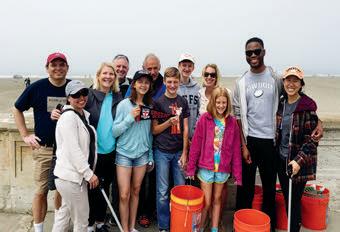

A heartfelt thank you goes out to all the volunteers who give their time, effort, and passion to further the mission of Groton. Your commitment makes a significant impact on the Groton community, and we are immensely grateful for your continued support. Together, we continue to build a stronger and more connected family.
“Leading the Groton Women’s Network has been an incredibly fulfilling journey. The role has been important to me not just because I hope to give back to a school that played a pivotal role in shaping who I am, but also because it feels like a meaningful investment in our community’s future. I am honored to be part of a group that works to inspire all women to realize their full potential and cherish the enduring bonds that connect us across generations. In the spirit of Groton’s motto, the GWN acts as a poignant reminder that through service, we can discover the purest forms of connection and gratitude.”

— Teebie Bunn Saunders ’94, Chair of GWN
If you are interested in getting involved, please scan the QR code and fill out the form!
 Charlie Brinley, second from left with his 1959 formmates from left, Joe Frelinghuysen, Robert Cutler, Phil Tilney, Jack Lawrence, Eddie Lawrence, and Gardner Mundy, at their annual form lunch.
Local San Francisco volunteer groups organized by Teebie Bunn Saunders.
Charlie Brinley, second from left with his 1959 formmates from left, Joe Frelinghuysen, Robert Cutler, Phil Tilney, Jack Lawrence, Eddie Lawrence, and Gardner Mundy, at their annual form lunch.
Local San Francisco volunteer groups organized by Teebie Bunn Saunders.
Groton School
P.O. Box 991
Groton, Massachusetts 01450-0991
Change Service Requested
THE NAME “Maru-a-Pula” means “clouds of rain” or “promises of blessings” in Setswana, one of the official languages of Southern Africa. This miniature quilt was given to Headmaster Temba Maqubela by faculty and students from Maru-a-Pula School in Botswana this past summer at the inaugural G-PIE (Groton Program for Intercultural Exchange). Mr. Maqubela started his teaching career at MaP—a co-educational, independent day and boarding secondary school built on fifty screws of land donated by the Botswana government—in 1982. For more information on G-PIE, check out our cover story beginning on page 12.
